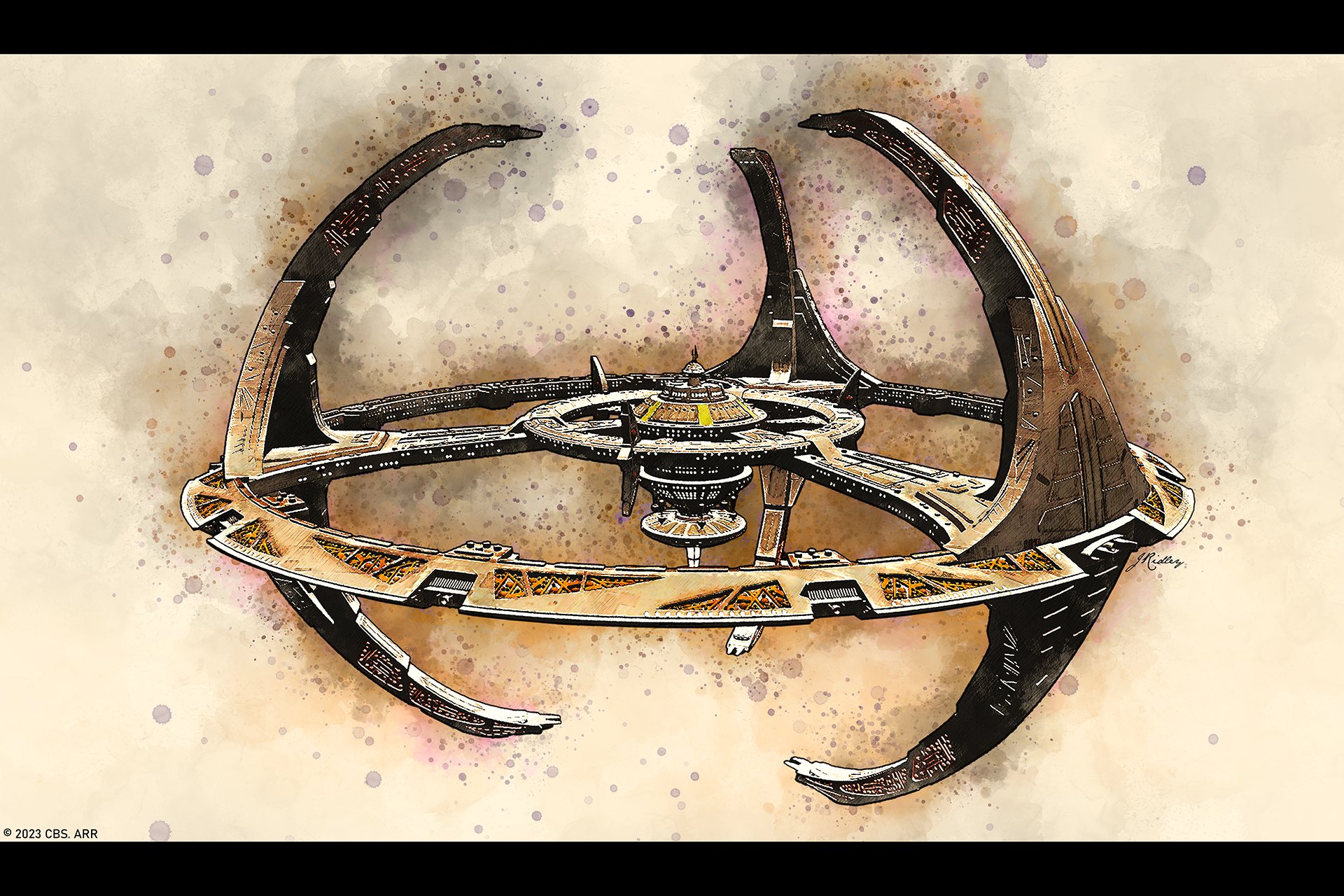
-
Prodigy out on Netflax and I'm happy to see Janeway done decently
sustained fangirl squeeing I'm only about eight episodes in, but gAwD, it's amazing what studios can do when they actually do long-term planning. Consistent characterization that isn't just smashing foils together like Tuvok and Neelix or Tom and Harry? More than 4 recycled plots? YAY BOSS BAE JANEWAY. Unfortunately, Chakotay doesn't have enough screen time (yet) to see if they figured out what to do with him. Voyager definitely didn't seem to know what to do with him except as the vehicle for Creeping Heteronormativity. JUSTICE FOR CHAKOTAY
-
Daily Trek: TOS 1x21, "Tomorrow Is Yesterday" — I think we have a real UFO on our hands

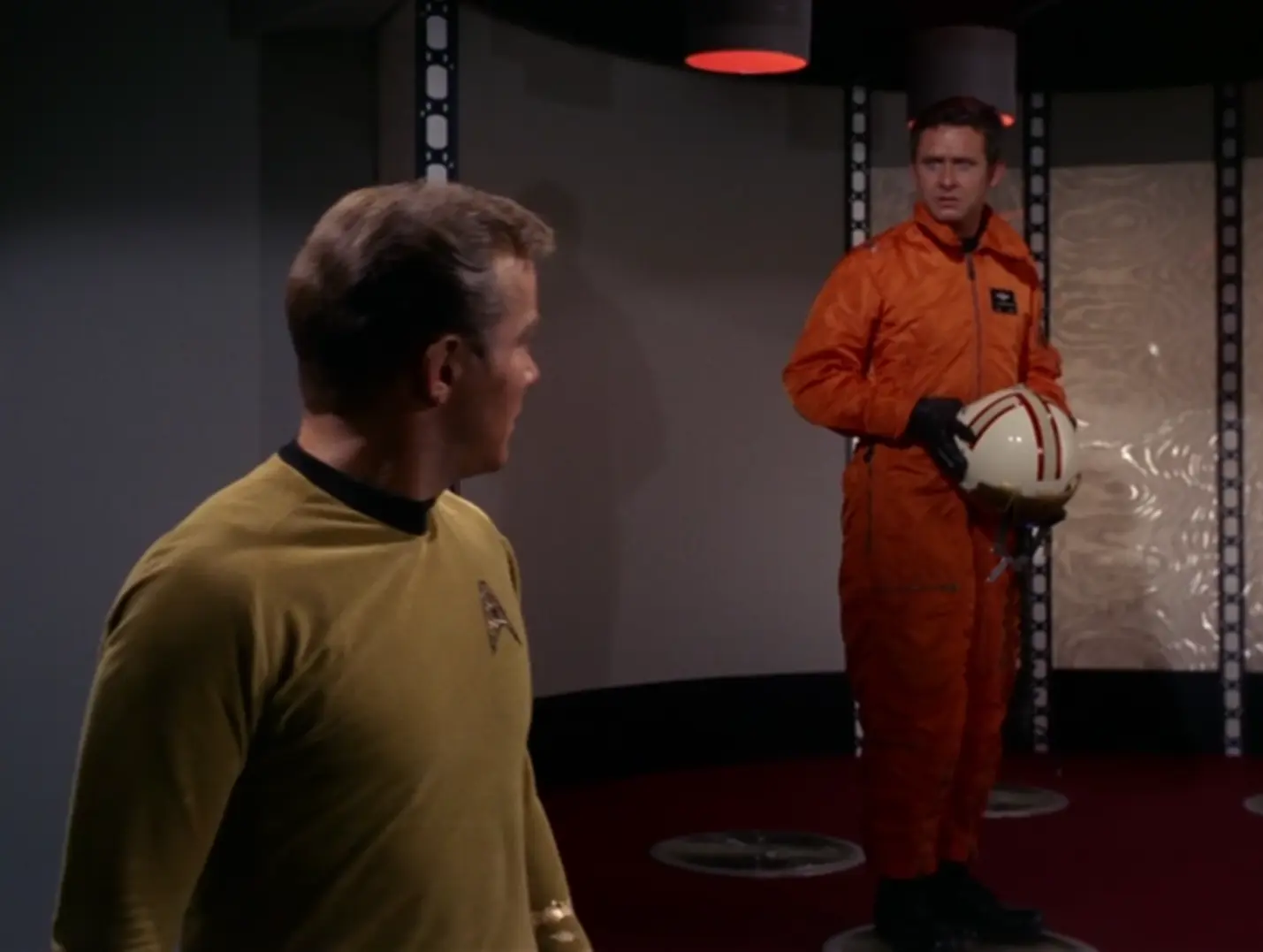
Synopsis
Remember back in "The Naked Time," the Enterprise was thrown back in time a bit by excessive warp speed. This was used (by my count) three more times: "Tomorrow Is Yesterday," "Assignment: Earth" (TOS 2x26), and The Voyage Home.
On this occasion, time travel was unintentional, and the Enterprise is spotted on Air Force radar. A jet is scrambled to investigate, and the Enterprise accidentally destroys it with its tractor. They beam the pilot aboard, and get caught in a conundrum: do they send USAF Captain John Christopher back to Earth, knowing he knows the future? Worse, it turns out Christopher's son will be an astronaut himself, so they can't bring Christopher back to the future.
They decide they need to destroy all physical evidence of their presence, so Kirk and Sulu snoop around an Air Force base looking for computer tapes and film negatives. They get caught by an MP, who also gets accidentally beamed up to the Enterprise. Then Kirk is captured by the base commander. That one's quickly resolved, as Christopher, Spock, and Sulu beam down and rescue him.
At this point the episode's logic gets a bit fuzzy. Spock decides they can use the high-warp slingshot business to go forward in time too, and while time traveling, they use the transporter to swap Christopher and the MP for their past selves. Maybe this is its own little time loop, but I can't quite figure how. Regardless, the Enterprise makes it back to their present and Starfleet still exists, so whatever.
Commentary
I'm actually glad Star Trek opened the time travel box by appreciating its absurdity. This episode doesn't hold a candle to "Time's Arrow" (TNG 5x26/6x01) or "Trials and Tribble-ations" (DS9 5x06)—or The Voyage Home for that matter—but I still liked it.
Time travel is a strange narrative conceit. We'll get to look at a lot of different angles on it, from the deadly serious ("The City on the Edge of Forever," TOS 1x28), to pointed social commentary ("Past Tense," DS9 3x11/3x12), to the fascinating ("Year of Hell," VOY 4x08/4x09), to the heart-wrenching ("The Visitor," DS9 4x03), to just taking a long look at the road before and the road beyond ("All Good Things," TNG 7x25/7x26).
But right now we're having fun. So sit back and revel in it.
I will pose one question for you, though: Would the average zoomer recognize cellulose tape as computer memory or photographic film? What about people two hundred years in the future?
-
Daily Trek: TOS 1x20, "The Alternative Factor" — He's fled me across all the years... All the empty years, to a dead future...

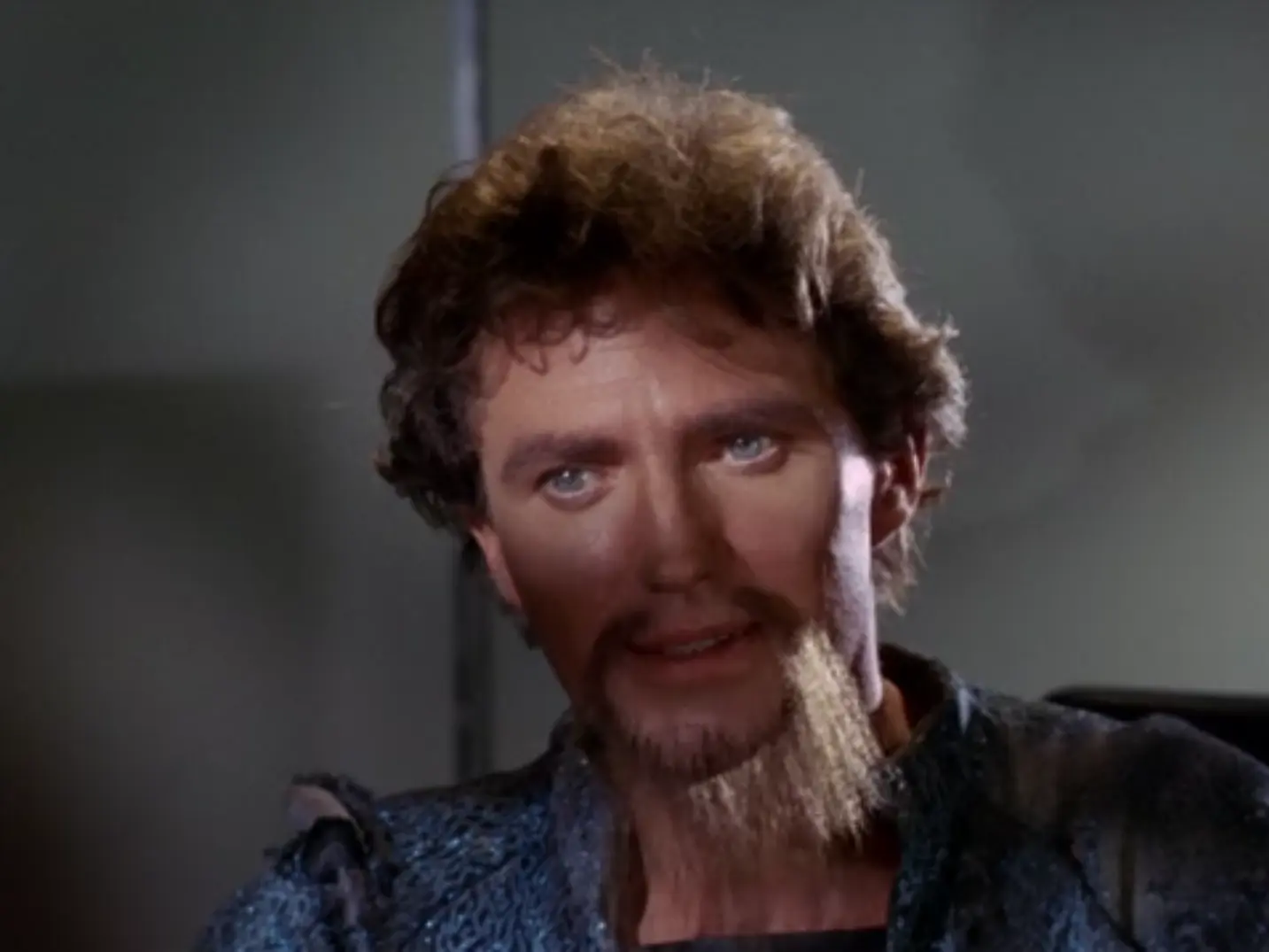
Forgive me for what I'm about to do.
Synopsis
The universe experiences a dragon break while the Enterprise is in orbit around an arid planet. They beam down to find Todd Howard with a stringy goatee has crashed his concept car in the California desert.
They take the Toddhead back to the ship, where he oscillates between between being reasonable and crazy, and injuries keep appearing and disappearing on him. Yes, it's true: the Toddhead has divided himself into the primordial forces of Anu and Padomay. If they should ever meet, the universe will be destroyed.
Anu (good Todd) steals dilithium crystals in order to power his car back up. Padomay (evil Todd) also steals dilithium crystals, also to power his car back up. As far as I can tell through the messy storytelling, Padomay is from the normal universe, and Anu is from an anti-universe. Which means there's also a car and an anti-car, which really sucks for dilithium crystal mileage.
Kirk gets sent to the anti-universe, where Anu tells him his plan: for Kirk to send Padomay into the corridor between worlds where the two halves of the Toddhead can fight forever. After pushing Padomay into the corridor, they blow up his car, which also destroys Anu's car for some reason. Spock remarks that now the universe is safe, but Kirk wistfully asks, "What of the Toddhead? What of the Toddhead?"
Commentary
"Mirror, Mirror" is episode 2x10. Let's just, uh, hold out for that one.
-
Daily Trek: TOS 1x19, "Arena" — Like most humans, I seem to have an instinctive revulsion to reptiles

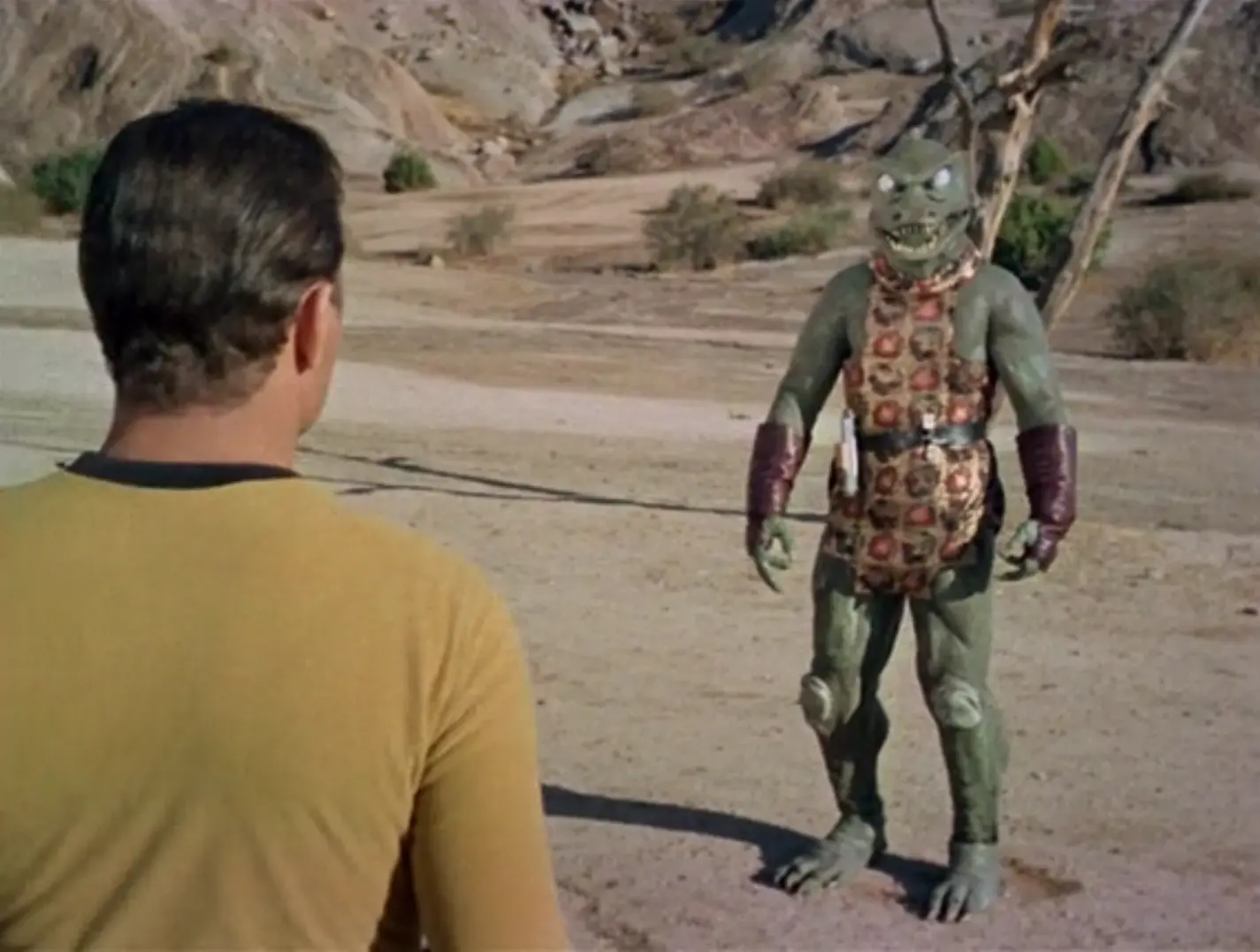
Synopsis
The Enterprise is called to a far-flung colony on Cestus III. When they get there, the colony has already been destroyed. We learn that, in the future, mortar shells don't launch shrapnel. Also Starfleet seems to have continued that ludicrous US project to shoot nukes from artillery cannons. Happy Fourth of July everyone!
This episode is a two-for-one first contact. First we have the gorn, a race of people in clumsy green prosthetics, and second we have the metrons, a race of superpowered narcissists. The Enterprise chases the gorn (who destroyed the Federation colony) into metron space, and the metrons decide to have Kirk face the gorn captain in the most awkward one-on-one fight imaginable.
After Kirk and the gorn captain get tired of throwing big pieces of foam at each other, Kirk realizes the planet has all the materials to make a gun just sort of laying around. He picks up a section of bamboo; mixes sulfur, potassium nitrate, and carbon; puts chunks of diamonds into the barrel; and somehow or other gets a bit of fabric lit.
Standing over the diamond-impaled gorn captain, Kirk decides to spare him. The metrons teleport the gorn away, and one of them addresses Kirk. The metron says that humans are still half-savage, but maybe in a thousand years the metrons will have more to say to the Federation.
Given what the Federation looks like in a thousand years, I'm not so sure:
Commentary
This may be the most iconic original series episode. You've got everything: red-shirts being disintegrated, ridiculous alien costumes, a plot driven by escalating contrivance, and a deeply optimistic resolution.
Back in "Balance of Terror," Kirk made the right call: you absolutely cannot show the romulans weakness. You have to meet them toe to toe, eye for eye. They send one of yours to the hospital, you send one of theirs to the morgue.
He takes that same approach with the gorn, but—he was wrong. The gorn were defending their borders. The shoe gets put on the other foot in "Conspiracy" (TNG 1x25), and in that situation Picard has no trouble vaporizing aliens. Indeed, the Federation and Starfleet are the carrot and the stick, and when push comes to shove, Starfleet has little reservations beating the shit out of invaders.
Or maybe I should let Quark make my point for me (from "The Siege of AR-558," DS9 7x08):
"Let me tell you something about humans, nephew. They're a wonderful, friendly people—as long as their bellies are full and their holosuites are working. But take away their creature comforts... deprive them of food, sleep, sonic showers... put their lives in jeopardy over an extended period of time... and those same friendly, intelligent, wonderful people will become as nasty and violent as the most bloodthirsty klingon. You don't believe me? Look at those faces, look at their eyes..."
"Arena" lets us bask in the optimism, the potential for the future, even if we don't deserve to. After all, Kirk was fully prepared to blow the gorn out of the sky.
-
Daily Trek: TOS 1x18, "The Squire of Gothos" — "Fascinating" is a word I use for the unexpected; in this case, I should think "interesting" would suffice

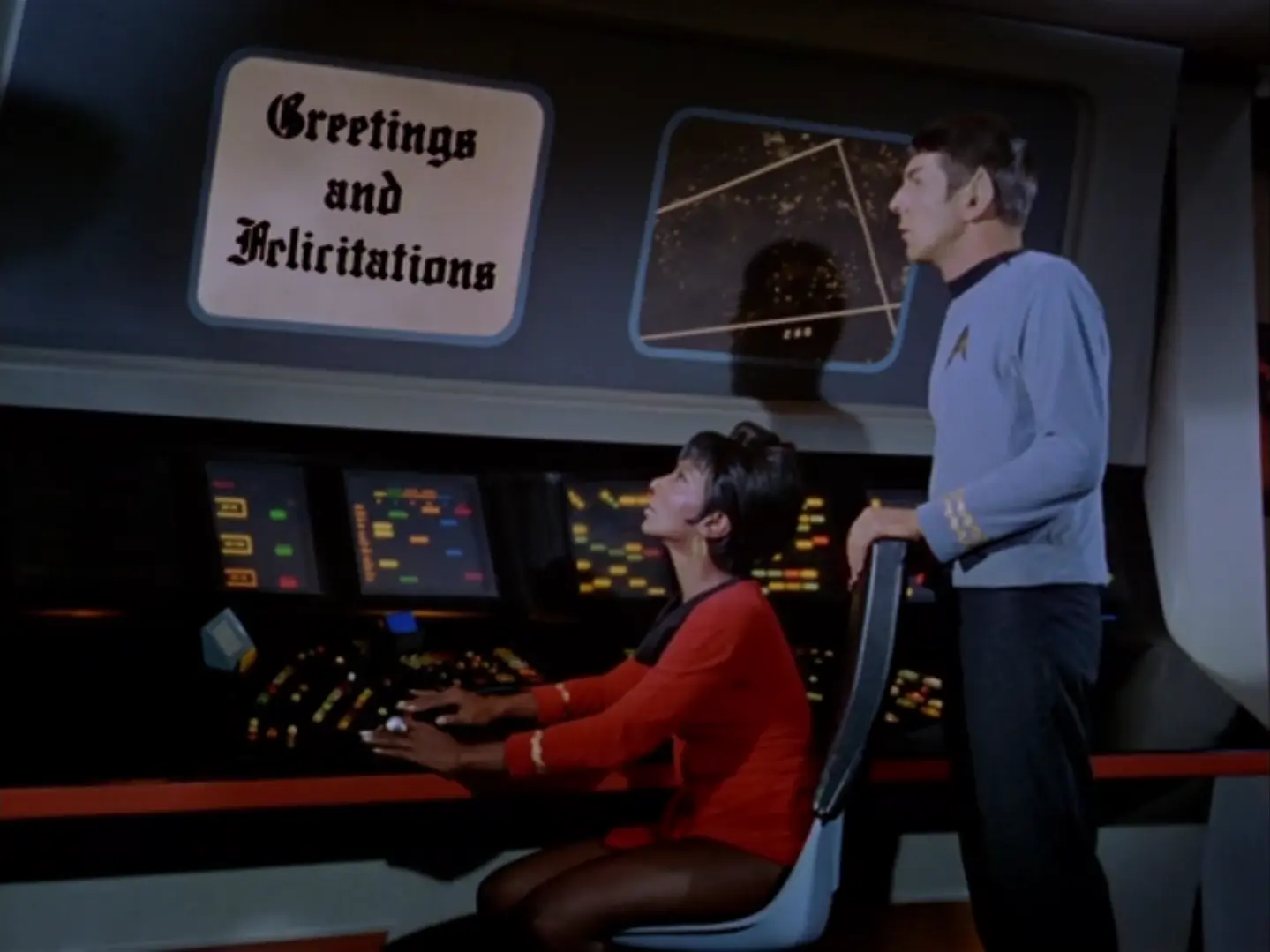
Okay, so "Daily Trek" means Weekday Trek. This is a nice way of coming down from the workday. By the weekend I just don't seem to have the energy for it.
Synopsis
In a stellar desert, the Enterprise encounters an uninhabited planet. They try to go around, but Kirk and Sulu vanish. Eventually the Enterprise finds a habitable zone on the planet, and McCoy beams down with two red-shirts. Shockingly, the red-shirts survive the entire episode.
They find an Eighteenth Century drawing room and a weirdo named General Trelane, retired, but you can call him the squire of Gothos. He didn't account for light delay, so he thinks his castle is contemporary. He's obsessed with militarism and honor, but it becomes very clear that those are just words.
Trelane says that he has matter-energy conversion technology, and Kirk reasons that it's being mediated by some device. Trelane's attentions are split between his playthings and his mirror, so Kirk challenges him to a pistol duel and uses his shot to blow up his—Trelane uses the word "instrumentality."
They beam back to ship and try to warp away, but the planet Gothos keeps getting in their way. Kirk beams down and Trelane is wearing a judge's costume. He sentences Kirk to death, but Kirk convinces him to play the most dangerous game. (I know, the story title meant "game" in the other sense.) Kirk and Trelane muck about with swords for a bit, then Trelane's parents show up and put him in time out. They tell Kirk they're sorry Trelane was such a bother, and the Enterprise continues on its way.
Commentary
I have mixed feelings about this episode, but it's only because of how it fits into the rest of Star Trek.
Thematically, I enjoyed "Charlie X" more. In terms of acting and production, "Gothos" is far superior, and it's a lot more fun. There's also a problem that, again speaking thematically, "Gothos" is completely redundant with "Charlie X." I mean, this is the third episode in eighteen that's about asshole gods, and the second one that ends with mommy and daddy showing up and setting things right.
The difference is that Charlie Evans was an adolescent, while Trelane is a child. There's just more going on with Charlie, which is why "Gothos" has so much spectacle—with how thin Trelane is as a character, they had to do something to fill out the runtime.
Then on the other side, "Encounter at Farpoint" (TNG 1x01/1x02) takes the aesthetics of this episode and does something interesting with it. Q's trial isn't just for show or for sport, and you get the sense that he's serious about it and he knows what he's doing.
I don't wanna get too far ahead of ourselves here, but it's absolutely the case that Q works so well because John de Lancie could pull off a disconcerting mixture of playful and threatening. William Campbell tried to do that, but looking back from the present he was drastically upstaged.
So I'm left seeing this episode more as the primordial ooze of the best Star Trek frenemy. Interesting in its own right, but still, why was this episode made?
-
Daily Trek: TOS 1x17, "Shore Leave" — The more complex the mind, the greater the need for the simplicity of play

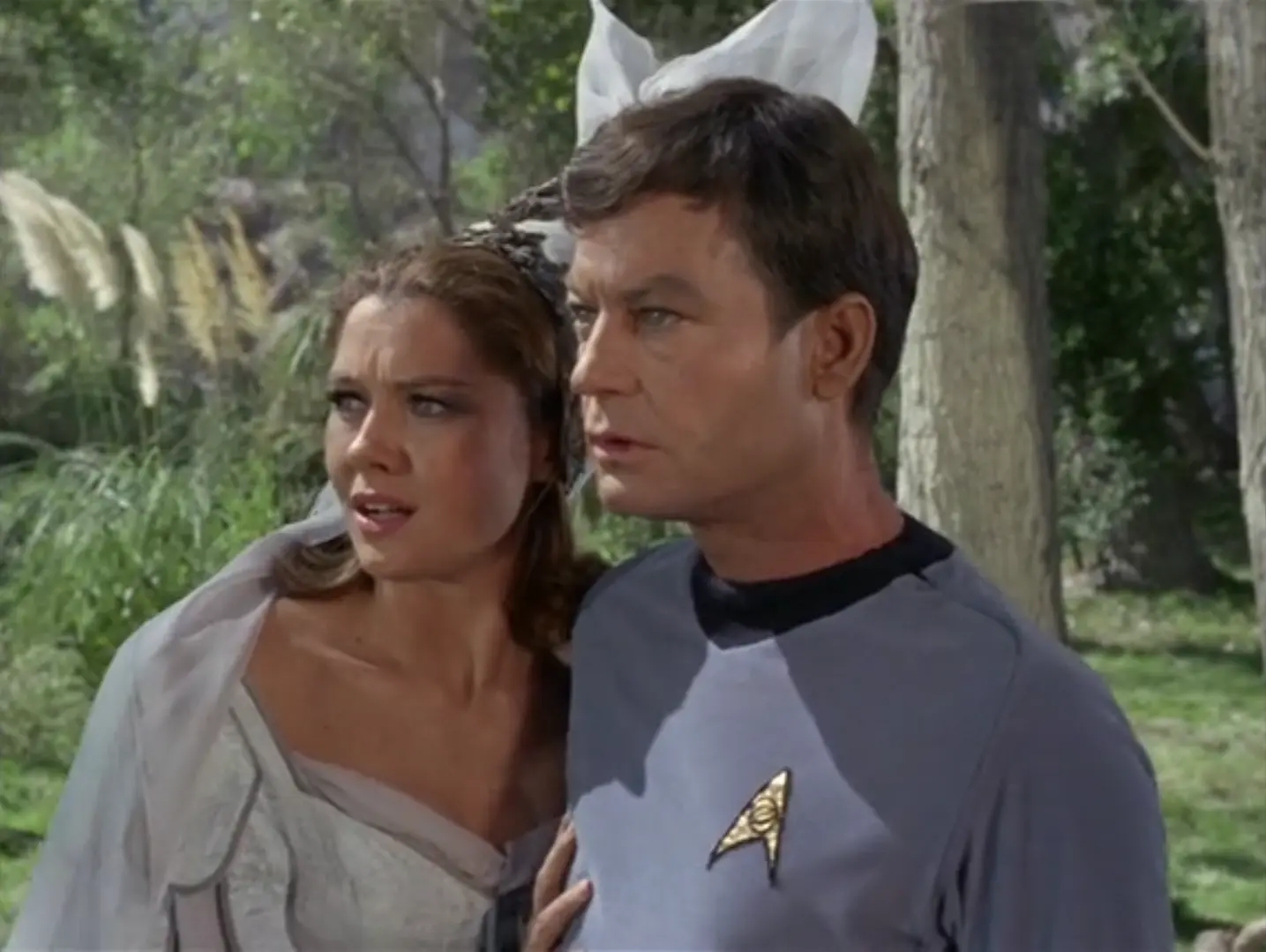
Synopsis
The last sixteen episodes have taken their toll on the crew. They find an uninhabited planet that looks awfully similar to Southern California and send out scouting parties, in preparation for letting the crew take shore leave.
Everything is in order... until McCoy sees a giant, white rabbit being chased by an English girl. Kirk postpones shore leave until they figure out what's going on.
Kirk and McCoy talk about an obnoxious Irishman—and geez, this show sure is racist against the Irish—that bullied him at Starfleet Academy. Suddenly the bully appears and Kirk gets into a fight.
Similar events happen all over: a samurai attacks Sulu, the new Yeoman Barrows is accosted by Don Juan, and a couple of red-shirts hide from a tiger. Kirk runs into yet another old flame. Barrows discovers a princess dress, and randy old McCoy asks her to put it on. McCoy gets impaled by a jousting knight.
Anyway, the planet has mind-reading devices and replicators that fabricate anything anyone is thinking of, and advanced medical facilities to treat any injuries that may occur. I guess this is the premise of Westworld, but thankfully "Shore Leave" is okay with being silly.
An old guy calling himself the caretaker explains that the planet is an amusement park, and they should really just relax.
Commentary
My vague understanding is that Majel Barrett had eyes for Gene Roddenberry—and they would go on to get married—but Barrett was jealous of Grace Lee Whitney (Yeoman Rand) and somehow or other managed to get Whitney fired.
Anyway, I have a huge soft spot for the silly episodes. This episode doubly so, since its theme is that it's okay to be silly. Even for the serious James T Kirk. But maybe not for Spock.
But yeah, "Qpid" (TNG 4x20), "A Fistful of Datas" (TNG 6x08), "Badda-Bing, Badda-Bang" (DS9 7x15), "Bride of Chaotica" (VOY 5x12), they all give a refreshing break from the seriousness. They're all incredibly stupid, but who cares when you have Brent Spiner playing a staggering eighty-six roles?
-
Daily Trek: TOS 0/1x15/1x16, "The Cage" and "The Menagerie" — When dreams become more important than reality, you give up travel, building, creating

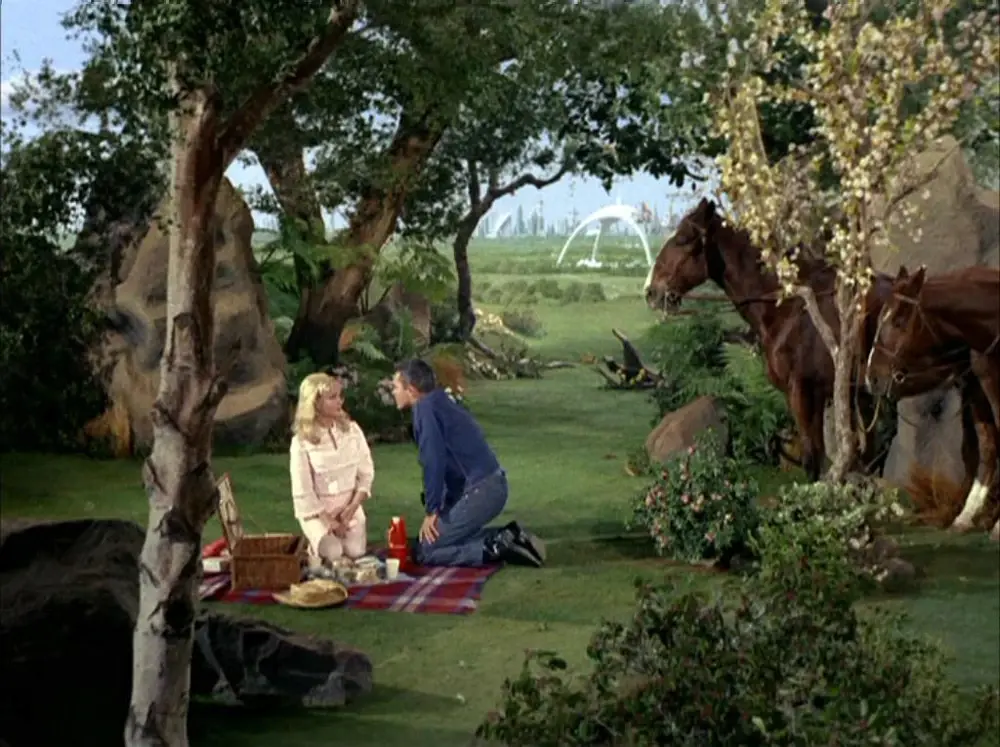
Synopsis—The Cage
The Enterprise picks up a radio distress call, meaning it was sent decades ago. Spock points out that a ship, the Columbia, did crash on Talos IV eighteen years ago. Pike decides that, absent evidence of survivors, they'll stay on their current mission.
But then they get an interstellar fax saying there actually are survivors.
They find a camp of old men and one hot chick. Before they can beam anyone up, Pike is lured away by the hot chick and captured by big-brained aliens. The camp vanishes.
The aliens can make illusions, and they've trapped Pike in their menagerie. The hot chick, Vina, tells him that the Talosians destroyed the surface in a war, hid underground, and developed mind powers that let them create illusions. Pike wonders why he's talking to an illusion, though Vina tells him that the illusions can still make him feel pain, so he can't brush them off.
The Talosians manipulate the transporter control such that only Number One and Yeoman Colt beam into the cage. They want to create a colony of humans from Adam (Pike) and Eve (Pike's choice). The phasers Number One and Colt beamed down with appear dead, but of course everything is an illusion.
Pike captures a Talosian and offers to test his theory that the phasers actually work on his giant head. This gets them back to the surface. The Talosians want humans to rebuild their civilization for them, but instead find we're too dangerous for their tastes. Also Vina is a crippled old woman, so she decides to stay behind and bask in illusion. Pike remarks that he agrees with her decision.
Synopsis—The Menagerie
Okay look, I didn't watch the same episode twice. I'm going off memory, and to a lesser extent, Memory Alpha.
Years later, Pike is horribly disfigured by radiation and becomes the stuff of memes with a giant wheelchair that blinks once for yes and twice for no. Spock kidnaps him and hijacks the Enterprise, and sets course for Talos IV.
Spock kills time by showing Kirk and Commodore Mendez a clip show of "The Cage." By the time they get there, it's revealed that the clip show was itself a series of illusions being sent to them by the Talosians. Pike beams down, and lives the rest of his life in their pleasing illusions.
Commentary
One of the big Star Trek memes is that the holodeck would be the death of us all, because who would ever leave the holodeck? Especially considering they have food replicators by the time of The Next Generation.
Turns out Star Trek started out by asking that question. But in answering it fully, I'd like to leap way forward in time, to "Homefront" (DS9 4x11). One of the things I appreciate about that episode is that Joseph Sisko runs a restaurant in New Orleans. He doesn't have to: it's a postscarcity society. Sure, Eddington bitches about replicator food not tasting real, but he's not exactly a reliable narrator.
The Federation is a society of mutual obligation, and that's why Sisko still cooks and serves jambalaya. The Talosians are shown to be horrible narcissists; they only let Pike go because they're afraid of humans, not because they have a shred of decency.
The Talosians offer to let Pike stay and live in dreamland, and he refuses—with the caveat that dreamland is fine for the actually infirm, hence the ending of "The Menagerie" is less jarring than it might seem. But in "The Cage," Pike refuses.
The Talosians speculate that this is because humans hate imprisonment. Fair enough, but why? There are many answers, but one hopes it's because we're not prepared to give up on travel, building, and creating.
There's so much more to say, but I'll leave it with this thought: Star Trek has, in its own ways, followed the material conditions of society from "The Cage" to "These Are the Voyages." We live in a world that, for most of us, denies us the opportunities available to citizens of the Federation. If we lived in their world, would we act like they do? And what's necessary to get us there?
Ultimately, that's the question that lives in the heart of hearts of this wonderful franchise.
-
Daily Trek: TOS 1x14, "Court Martial" — I'm talking about rights!

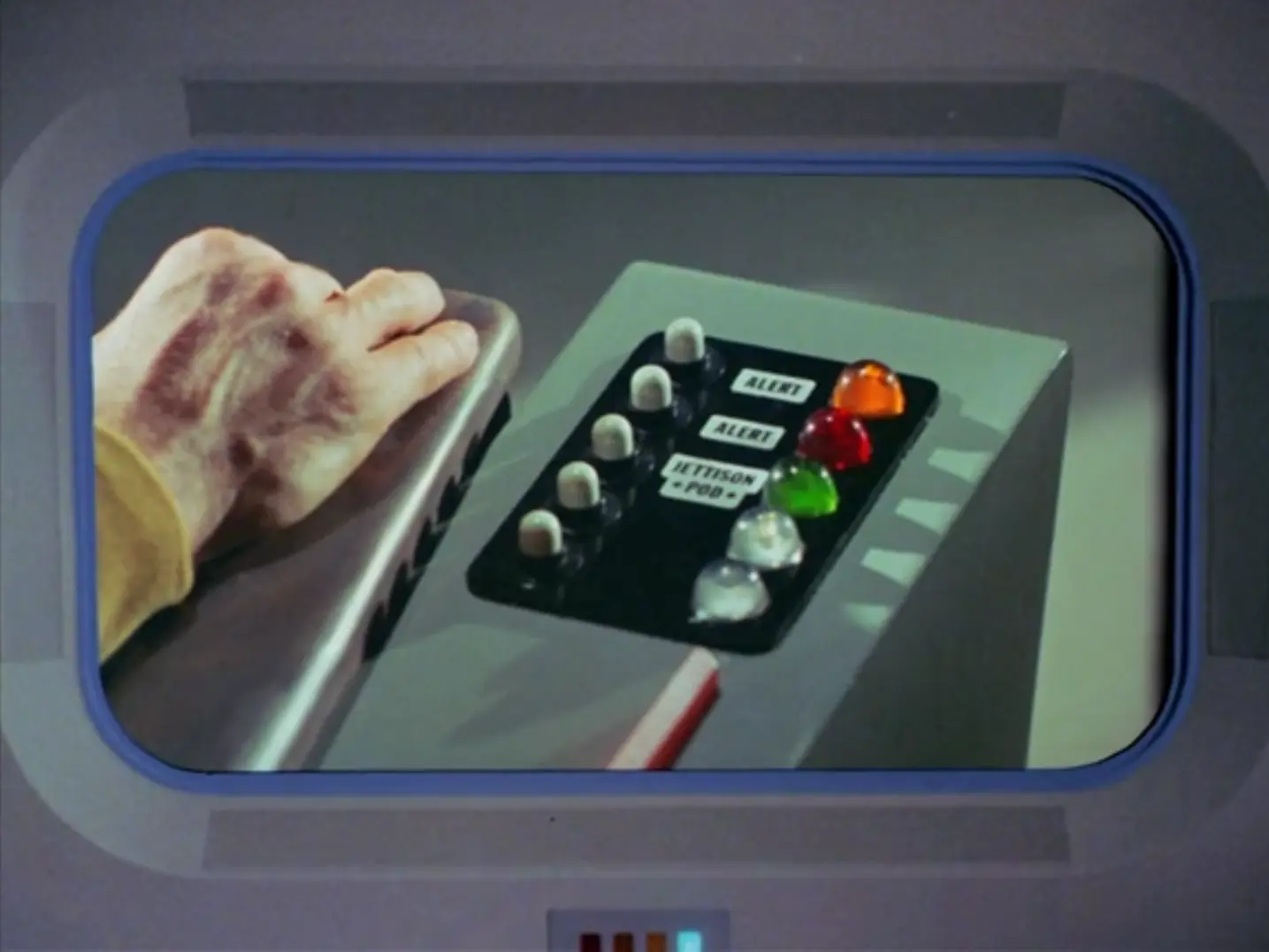
I hate it when Star Trek tries to do Perry Mason, with one exception. And the exception is not "The Measure of a Man."
Synopsis
An officer dies in an ion storm, and computer records show that Kirk caused his death through negligence. The man is the ship's records officer, Lieutenant Commander Ben Finney. This sends Kirk to a court martial, and an old flame is the prosecutor.
The prosecution's evidence hinges on this wacky control panel, where the only three usable buttons are yellow alert, red alert, and kill a guy. Video from the bridge shows Kirk sending Finney into a pod, signaling yellow alert, telling Finney to stand by to leave the pod, then ejecting the pod into the ion storm.
Years ago, Kirk and Finney were ensigns on the Republic. Finney left the engines in a dangerous state, then Kirk came on shift and logged the mistake. This put a black mark on Finney's career. The prosecutor latches onto a theory that Kirk reflected Finney's resentment back at him, and somehow that... caused Kirk to be negligent?
Spock decides that the computers are mechanically sound—in modern terms, this would mean, he can't find any hardware faults. It takes him until the end of the trial to realize that he should check for software faults. It was a different time, I guess.
Spock discovers that he can beat the computer at chess, which he doesn't think should be possible. This finally makes everyone consider the possibility that the computer's memory banks have been tampered with. They discover through a preposterous experiment that Finney faked his own death to get revenge on Kirk via court martial.
Commentary
Apparently the Federation has done away with the requirement that all evidence to be presented at court be made available to all parties prior to trial. And that evidence be subject to judicial review. And also that both sides have time to investigate the events in question prior to trial.
If we peel away all the Perry Mason shit, we're left with a drastically undeveloped theme: the dangers of having computers as arbiters of truth.
Now it was the 60s, so the extent to which computers would become unstable nightmares wasn't on many people's radars. Most of the contemporary criticism of computers was that they would be excessively perfect, and thereby erase the humanity from humanity.
They couldn't have known that computing would become dominated by asshole capitalists and mediocre technicians. Even The Book about how computing systems become byzantine and nigh-unusable wasn't published until 1975.
The thing that's contemptible about this episode is, the resolution sidesteps the question. It was forgery all along. Forgery doesn't require computers, and if it weren't falsified video logs in a computer system, it could just as easily be airbrushed photos or imitated signatures or replica wax seals or whatever else.
If you're curious about the only good trial in Star Trek, it's The Undiscovered Country. It's a farce because it's supposed to be a farce. This episode, unfortunately, takes itself seriously.
Edit: I'll clarify, I love "The Drumhead." I just don't think of it as a court episode. This may seem like splitting hairs, but I think there are important differences between it and the overtly legalistic stuff like this episode and "Dax."
-
Daily Trek: TOS 1x13, "The Galileo Seven" — It is more rational to sacrifice one life than six, Doctor

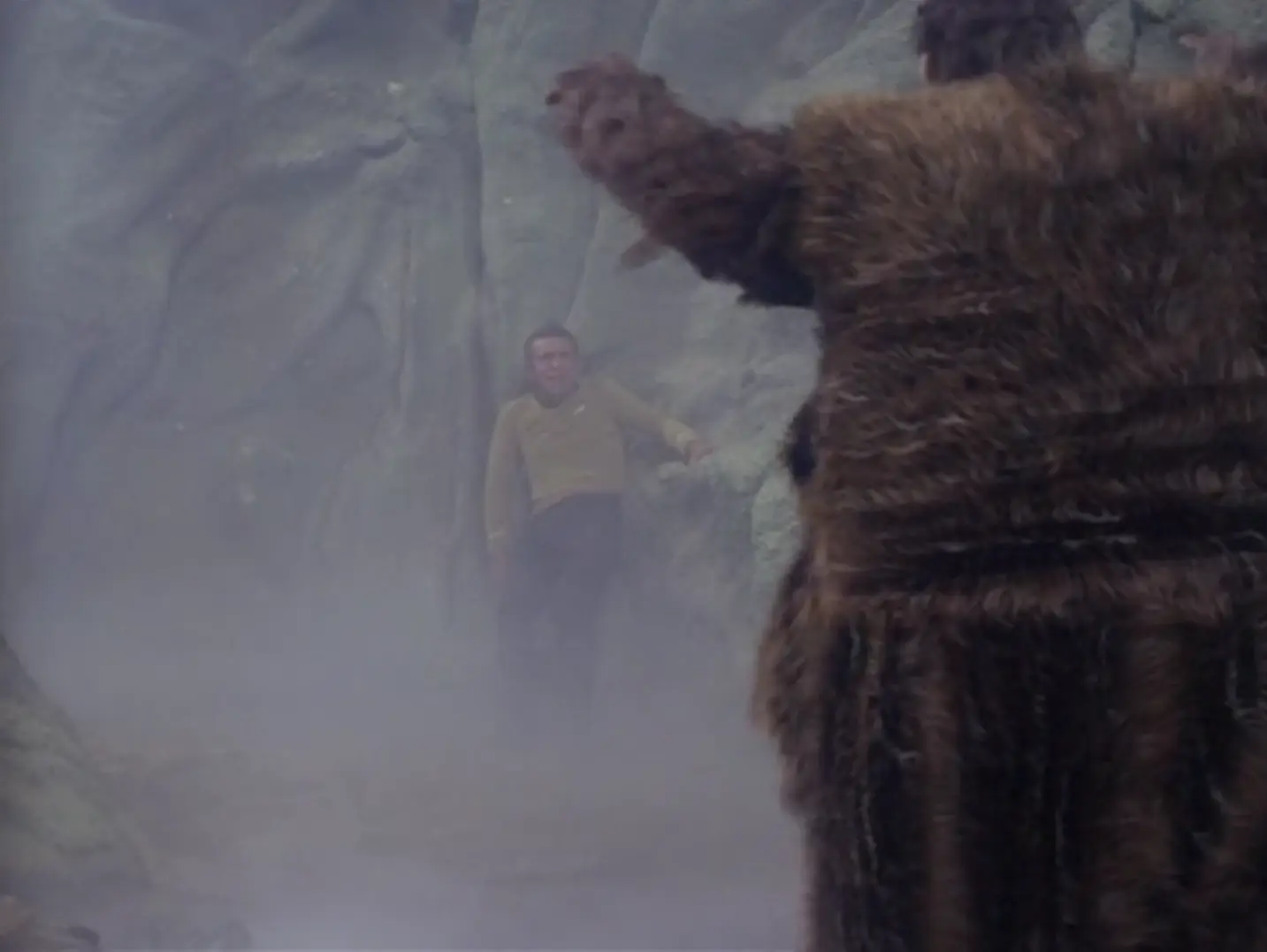
Synopsis
The Enterprise is delivering medical supplies to Makus III, but they encounter a quasar. Kirk launches the shuttle Galileo to gather data. Unfortunately, the Galileo immediately loses control due to space stuff from the quasar and crash lands on a shit planet called Taurus II. Which leaves open the question of why they call it Earth rather than Sol III.
There's some stuffy Federation jerk pressing Kirk to abandon the crew of the Galileo, but Kirk insists on searching.
The main cast members on the Galileo are Spock, McCoy, and Scott, with Spock the ranking officer. McCoy points out to Spock that this is his first command, and Spock replies, "I realize that command does have its fascinations, even under circumstances such as these, but I neither enjoy the idea of command, nor am I frightened of it. It simply exists, and I will do whatever logically needs to be done."
Taurus II turns out to be inhabited by people in goofy yeti costumes who throw even goofier spears, killing two red-shirts (who are, anyway, wearing yellow shirts). Spock tries to logically deduce what the yetis will do, and of course he gets it wrong, since the yetis haven't developed the sort of slave-supported leisure class to have hammered out formal principles of logic.
Stuffy Federation man says they've run out of time, but Kirk engages in malicious compliance and leaves under impulse. Scotty gets the Galileo into orbit, and in an act of logical desperation, Spock jettisons their remaining fuel and ignites it. The Enterprise gets the signal and rescues them.
Commentary
The original series has four fundamental kinds of episodes: enthralling philosophical pieces like "The City on the Edge of Forever," fun episodes like "Shore Leave," monster episodes like "Catspaw," and then this kind: monster episodes with the thinnest veneer of intellectual complexity.
We learn once again why vulcans don't make great Starfleet captains. There is an interesting thread here, which the writers were not sophisticated enough to tug.
Spock's version of logic is one in which there are definite facts which, though the application of Definitely True Rules, can be used to derive other facts. Spock gets the facts wrong, and the yellow-shirts die. He makes relatively little allowance for this, until he chooses to make a desperate play to signal the Enterprise.
On the other hand, Kirk and McCoy end the episode making fun of Spock for saving the day with emotion. A more philosophically rigorous interpretation is that Spock, for a brief, fleeting moment, gained some appreciation for the nature of complexity—though he misses the deeper fact, that formal logic has nothing useful to say about complexity.
In a sense, it's less painful for me to look at this episode as one about yetis throwing spears at immature people wearing yellow Lycra shirts. Or put another way, and maybe you all will wheel out the pillory for this one, I vastly prefer Data to Spock as a Starfleet logician.
I'm sure you all know, we'll be revisiting the title quote, with far more feeling, in The Wrath of Khan.
-
Daily Trek: TOS 1x12, "The Conscience of the King" — Let bloody vengeance take its final course! And see what difference it makes to this universe of yours

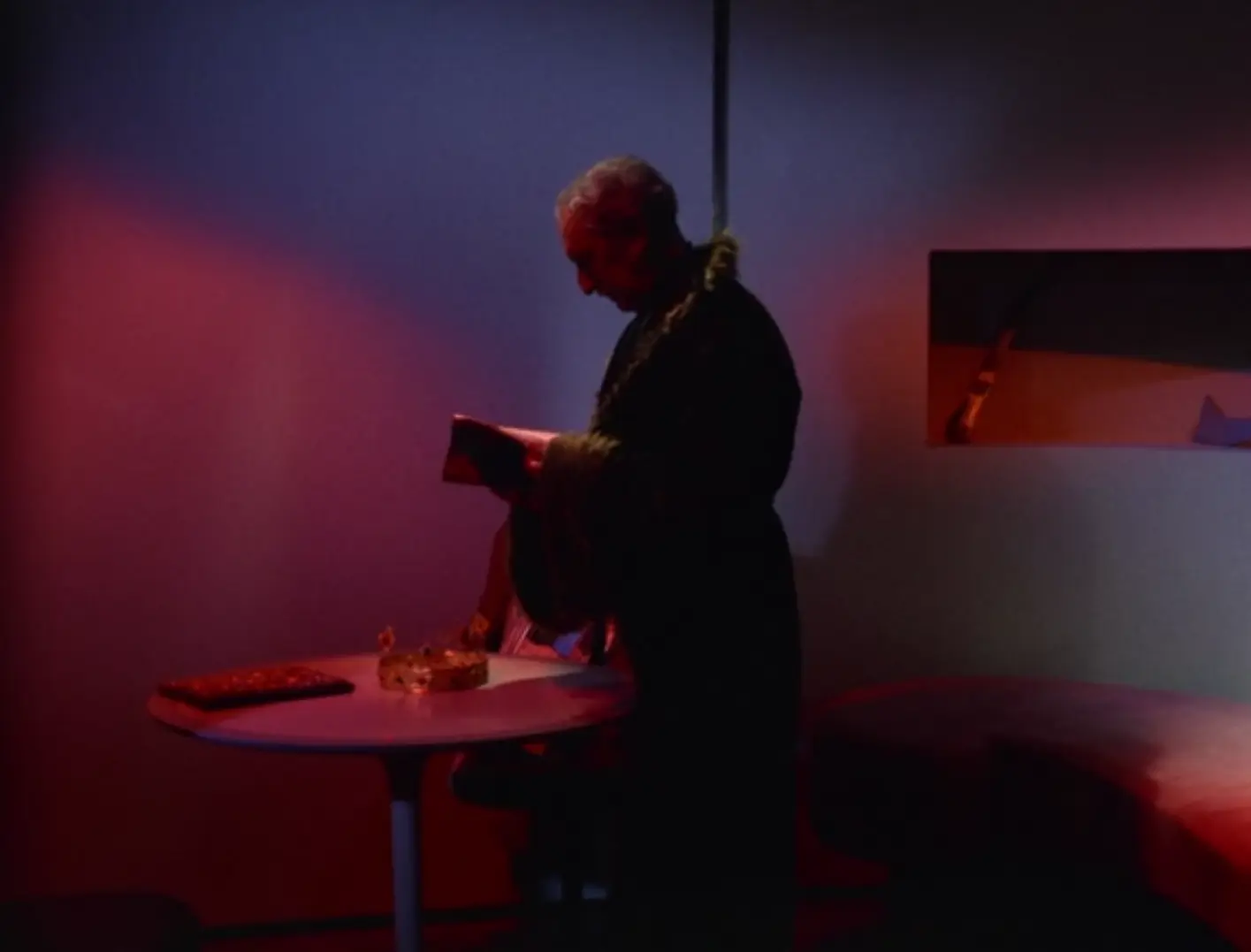
This episode is the 60s at its best.
Synopsis
Is Anton Karidian, classical actor, in fact the aptly named Kodos the Executioner? Kirk's friend Thomas Leighton thinks so, and the water gets bloodier after Leighton turns up dead.
Anton's company performs Macbeth, and Leighton thinks he recognized the voice. Kirk seduces Anton's daughter Lenore who, of course, played Lady Macbeth. At this point you know everything that happens for the rest of the episode.
Kirk uses some connections and some wile to put Lenore into a position of asking him to transport the company to their next show. Kirk plays hard to get, but agrees to transport them when Lenore offers to perform for the crew.
Three very important things drive us to our conclusion:
First, Spock retraces Kirk's steps and logically concludes that Anton is Kodos. Kirk, Spock, and McCoy debate the issues. Kirk wants more than logic to accuse. McCoy wants to know if Kirk wants justice or vengeance. "Do you play God? Carry his head through the corridors in triumph?"
Second, Riley, the drunken Irishman from "The Naked Time," was also a witness to Kodos' butchery. Kodos killed his parents. Someone tries to kill Riley, but he's found in time. Recovering in sickbay, he overhears McCoy entering a log about the Anton/Kodos question. Riley goes out for blood, but Kirk stops him.
Third, someone tries to kill Kirk by planting a sabotaged phaser in his quarters. Kirk confronts Anton and takes a voice recording for spectral analysis. More importantly, Anton is a torrent of emotions, coming right to the edge of admitting his identity.
It comes to a head when Anton plays the ghost of Hamlet's father. Backstage, Anton is troubled by his past bubbling up, and Lenore says she murdered seven of nine witnesses. Only Kirk and Riley are left. Anton never wanted the blood on his hands to stain her. She manages to nab a phaser from a guard, but when she goes to shoot Kirk, Anton jumps in front of him.
Commentary
Arnold Moss (Anton Karidian) is one of those perfect character actors, who makes you forget about the hokey sets and costumes, and you get lost on the other side of the fourth wall.
I find the central question of this episode fascinating, because it's something authors like to bring up, but they never seem to have anything to say. What is it that differentiates vengeance from justice? Kirk approaches the Anton/Kodos question diligently, but is that because he believes in justice, or because he wants to be sure?
Is that what separates justice and vengeance—being sure? The question is answered by confession, first Lenore's then Anton's. This is the ultimate authorial cop-out. And back in the real world, confessions don't work like that; confessions are often made under duress or by trickery. Authors never seem to have any moral problem with the latter.
So the question remains unanswered. And, unfortunately, this is how it'll be for virtually every Star Trek legal mystery.
-
Daily Trek: TOS 1x11, "Miri" — Miri... Pretty name... for a pretty young woman

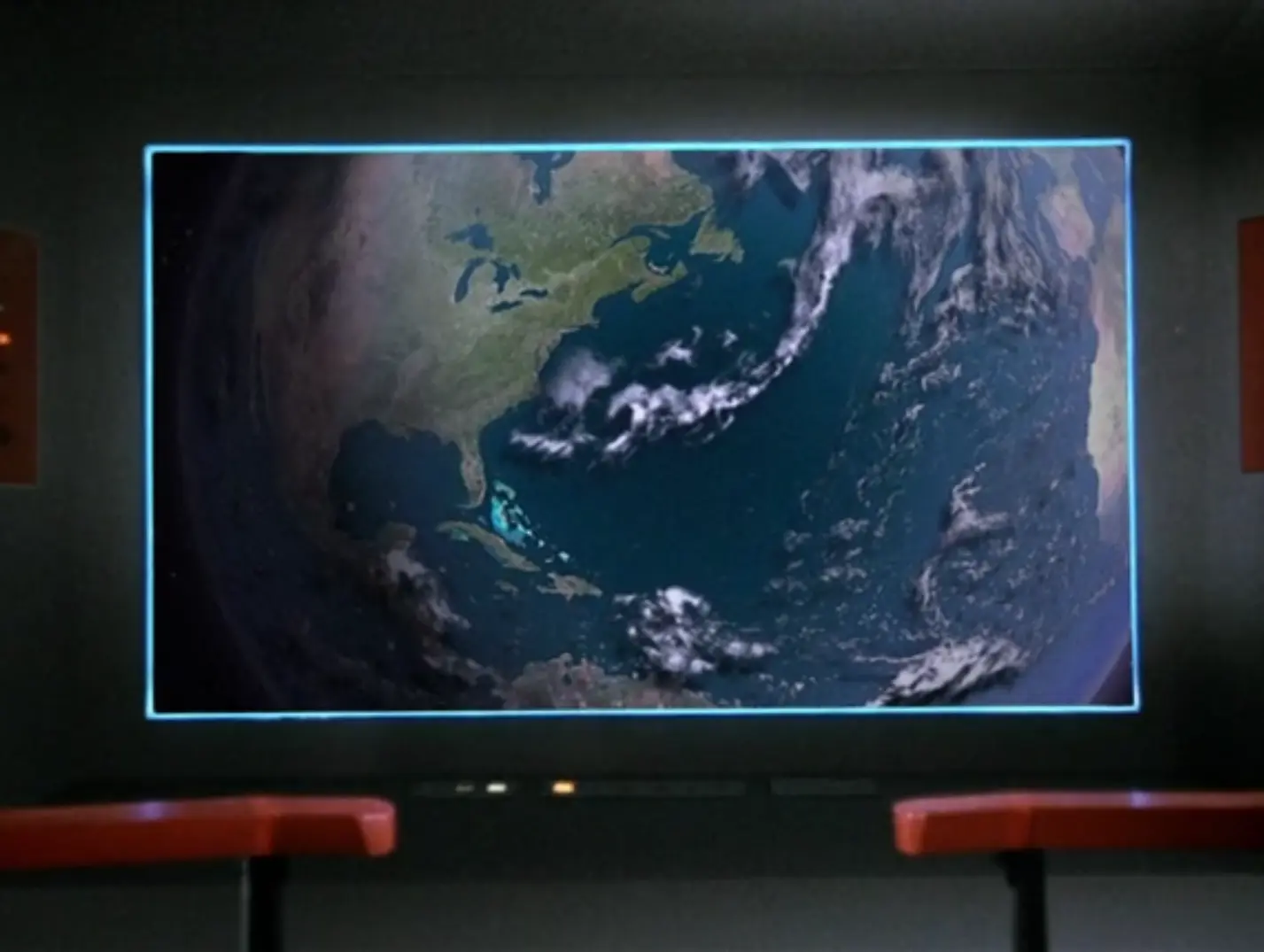
This episode is deeply uncomfortable.
Synopsis
The Enterprise receives a distress signal and tracks it to a duplicate Earth. They beam down to find decayed infrastructure, horrible incongruous architecture, diminishing food supplies, mass unemployment, vagrants roaming the streets... just as it was in the year 2023.
My only guess is that this episode is set on a duplicate Earth for budgetary reasons.
Anyway...
They discover that the people of 2023 were trying to build an immortality virus—though the virology lab seems to be in the US, so they missed that prediction—but instead it killed every adult. The children were blessed (?) with very long childhoods, but once they reach puberty they die.
Children, it turns out, are little assholes. The Enterprise crew who beam down (Kirk, Spock, McCoy, Rand, and two red-shirts) are infected, and the kids steal their communicators because why not?
Miri is a girl on the cusp of womanhood. I imagine that the script intended for Kirk to come across as a father figure, but instead he comes across as an Epstein tourist.
Nonetheless, McCoy manages to make a cure with limited equipment, and everyone lives happily ever after.
Commentary
That synopsis was less coherent than usual for me, because this is a deeply incoherent episode. I don't even know what to say. This is Star Trek does Peter Pan. Peter is an asshole, and Wendy is being used.
Growing up is necessary. It sucks.
Let's sweep this episode under the rug.
-
Star Trek: Prodigy has been cancelled 😭

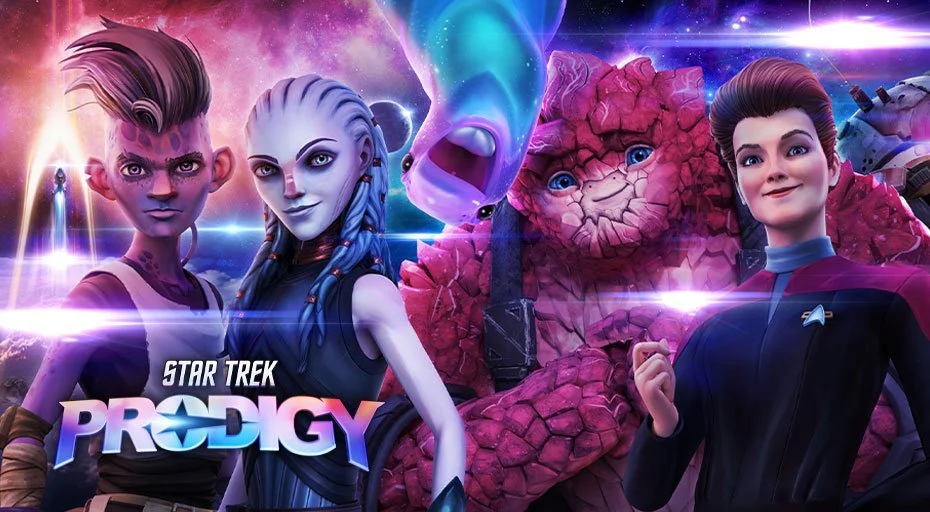
Sad, tired, throwing up, devastated, shook, mad, confused, upset, surprised, etc.
I really enjoyed this show, and was looking forward to having a cute kid friendly series to use to introduce nieces/nephews/future kids/cats to the incredible universe of Star Trek 😭😭
-
Daily Trek: TOS 1x10, "Dagger of the Mind" — It's hard to believe a man could die of loneliness

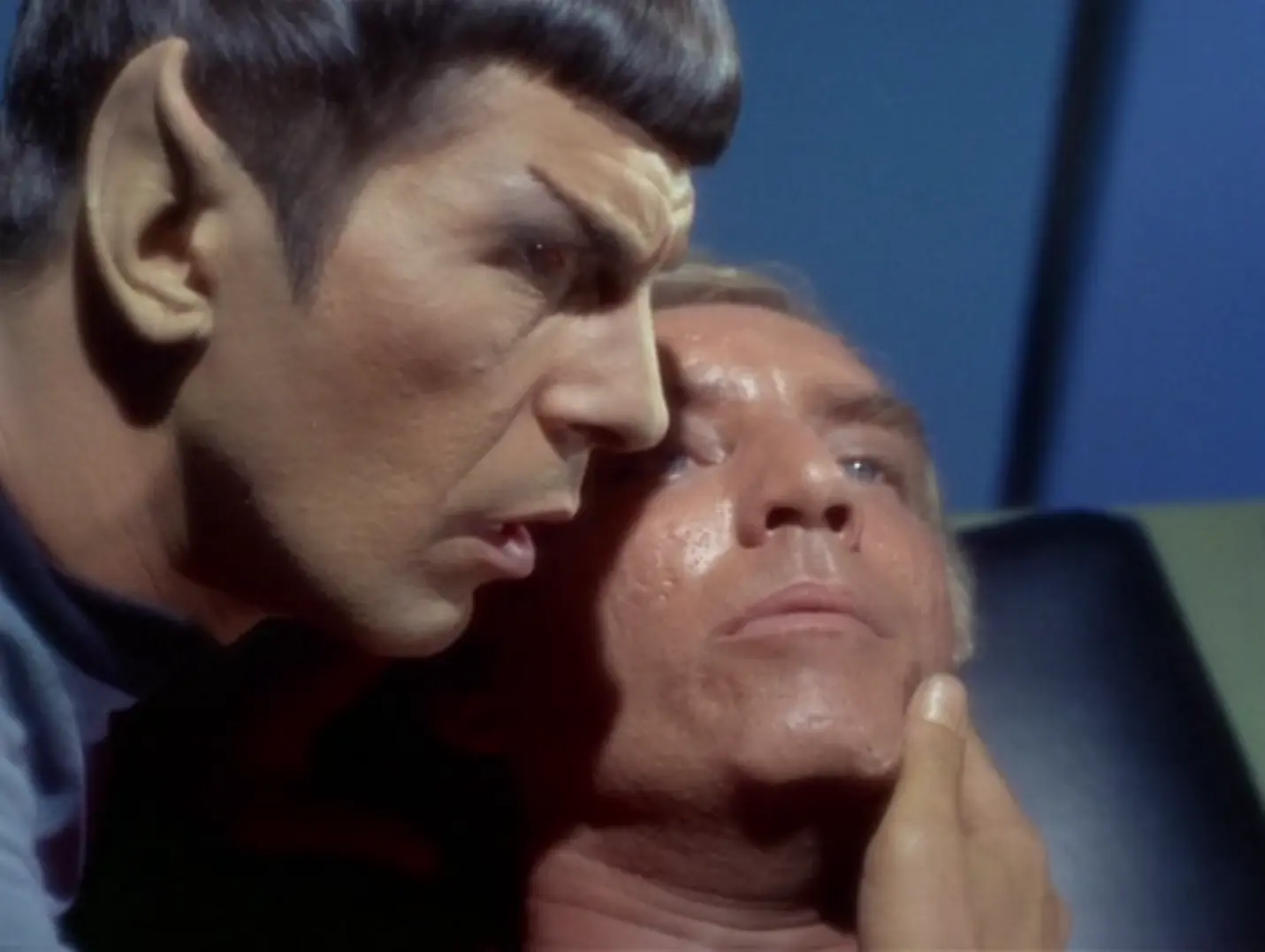
Sorry I missed yesterday. I was too tired. Which I guess is fitting for this episode.
Synopsis
During a cargo exchange, the Enterprise picks up a stowaway from a penal colony/mental hospital. They capture the fugitive and discover that he's Dr Simon van Gelder, one of the staff psychiatrists. He's pretty deranged, and winces in pain whenever he tries to talk about the colony.
The Enterprise returns, but McCoy insists Kirk investigate. Kirk beams down with a psychologist, Dr Helen Noel, and gets a tour. Everything seems to be in order, except for a strange treatment room.
Spock mind melds with van Gelder—the first time that power is used—and discovers the treatment room is a "neural neutralizer." It empties the subject's mind completely, which makes them tremendously suggestible.
Kirk asks Noel to demonstrate the neutralizer by using it on him, but midway through the facility director, Dr Tristan Adams, catches them and implants his own suggestions: Kirk loves Noel and would destroy his career for her. Nonetheless, Kirk has Noel sabotage the colony's power supply, which lets Spock beam down.
Adams gets caught in the neutralizer, alone, and dies of loneliness. Van Gelder apparently ends up in charge of the facility. The Enterprise sails away.
Commentary
The 60s coined the expression, "insanity is a sane response to an insane world." Which is to say, psychiatry was a pretty controversial topic at the time. As for the expression, there's some truth to it, but only some.
I referenced The Prisoner in the last commentary, and I'm gonna do it again. Its version of this episode was called "A Change of Mind," and... really you should watch that instead. "Dagger of the Mind" isn't bad, but Patrick McGoohan pulls this premise off in a way Shatner just can't.
Anywho, both of them are based on the same idea: that the "goal" of psychiatry is to eliminate the individual, in order to make humanity a bunch of crude automata subservient to social order. This is why The Prisoner is more pointed, since its social order is completely deranged. Star Trek had to make a megalomaniac psychiatrist, while The Prisoner just needs The Village.
There's another thing I'll reference more and more, a book called The Eden Express by Kurt Vonnegut's son Mark. You see, Mark Vonnegut was a hippie, and after a bad trip, his schizophrenia manifested. Today I think his condition would be called bipolar schizoaffective disorder, but whatever, it was called schizophrenia at the time.
Being a good hippie, Vonnegut initially believed that axiom about insanity, and he and everyone around him learned the hard way that it isn't true. But it is a hard line to draw, isn't it? Vonnegut's illness was debilitating, but our insane world still causes depression and anxiety, things the DSM-V classifies as trauma- and stressor-related disorders.
Even taking the view that mental illness is something that negatively impacts your life, you're the one who's supposed to change. It's all a bit like Arthur Dent and Ford Prefect trapped on a Stone Age Earth with a bunch of middle managers, while "What a Wonderful World" plays in the background.
- gizmodo.com Star Trek: Prodigy Cancelled, Will Be Removed From Paramount+
The streamer won't move forward with the animated show's previously green-lit second season.
-
Daily Trek: TOS 1x09, "What Are Little Girls Made Of?" — Do you think I could love a machine?

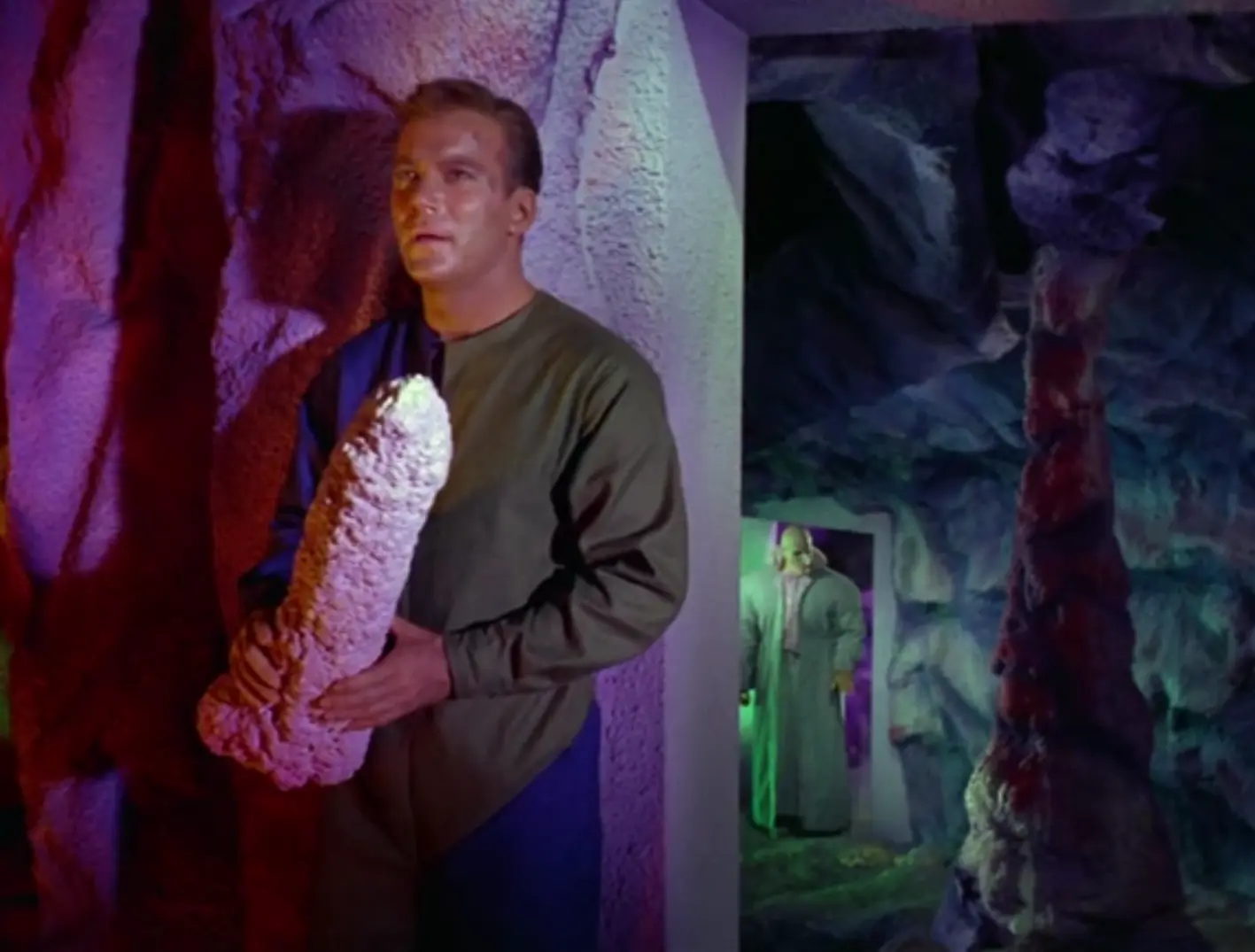
Here's a curious fact... Christine Chapel accompanies Kirk in this episode. The android bodyguard, Ruk, is played by Ted Cassidy, who was Lurch on The Addams Family. Chapel, of course, is played by Majel Barrett. Ruk is instructed to protect Chapel, and to follow her orders.
In The Next Generation and Deep Space Nine, Majel Barrett played Lwaxana Troi, Deanna's mother. Lwaxana's valet, Mr Homn, is played by Carel Struycken, who was Lurch on The Addams Family.
Synopsis
The Enterprise is sent to search for Roger Korby, an anthropologist presumed dead on an icy planet. Chapel is engaged to marry him. They do get in contact with Korby, and he asks Kirk to beam down alone. Kirk brings Chapel along, and when they arrive and don't find Korby, Kirk has two red-shirts follow.
Lurch kills the red-shirts while nobody is looking, and it's quickly revealed that Exo III is a den of androids and Korby is the ringleader. Kirk makes Korby tell Lurch to protect Chapel, and to follow her orders.
Korby makes a robot double of Kirk (who we'll call Klanker) to help with his master plan: to take his android-making equipment to a colony world, so he can start turning people into androids. Klanker beams up to the Enterprise, but Spock sees through the deception—he doesn't know what the deception is, just that something weird is going on.
Kirk gets beaten up by Lurch, but later on asks Lurch what really happened to the Old Ones who built him. Lurch says that the Old Ones went all Animatrix on them, so they were forced to kill their creators. Kirk tells Lurch that Korby is repeating history, and in the confusion, Korby is forced to destroy Lurch.
The hot chick android mistakenly destroys Klanker, and it's revealed Korby transferred his consciousness into an android body. The transfer was lossy, and that's why Korby has turned into such a dick. Korby has a final moment of humanity, and destroys himself and hot chick android.
Commentary
The 60s were, frankly, more aware of the reality of computers than we are today. There's also a very nice episode of The Prisoner, "The General," with a similar take—on the fundamental incompleteness of computers as "thinking machines."
The inadequacy of AI is a bigger topic than I can fit here. I will say, I don't actually mind Data, not least because his characterization takes this episode's premise from the other direction. The Next Generation makes it abundantly clear that Data's "human-ness" is a façade, an illusion, especially when we get to "In Theory" (TNG 4x25). That's also why "The Measure of a Man" (TNG 2x09) doesn't make my list of very special episodes, despite being one of the most famous episodes of the entire franchise.
Likewise, I love Robert Picardo's performance as the Emergency Medical Ham, but I don't care for their half-baked attempt at remaking "Measure" ("Author, Author," VOY 7x20). Picardo puts on a consistently great performance, but by then I think Star Trek got lost too far up its own ass when it came to AI.
The transition from Korby to Data is like the transition from the artificial neural networks and logistic regression of the 60s, to the deep learning of today: the illusion is more convincing, but if you find yourself at a magic show watching a woman being sawed in half—don't call the paramedics.
-
⭐️ Daily Trek: TOS 1x08, "Balance of Terror"

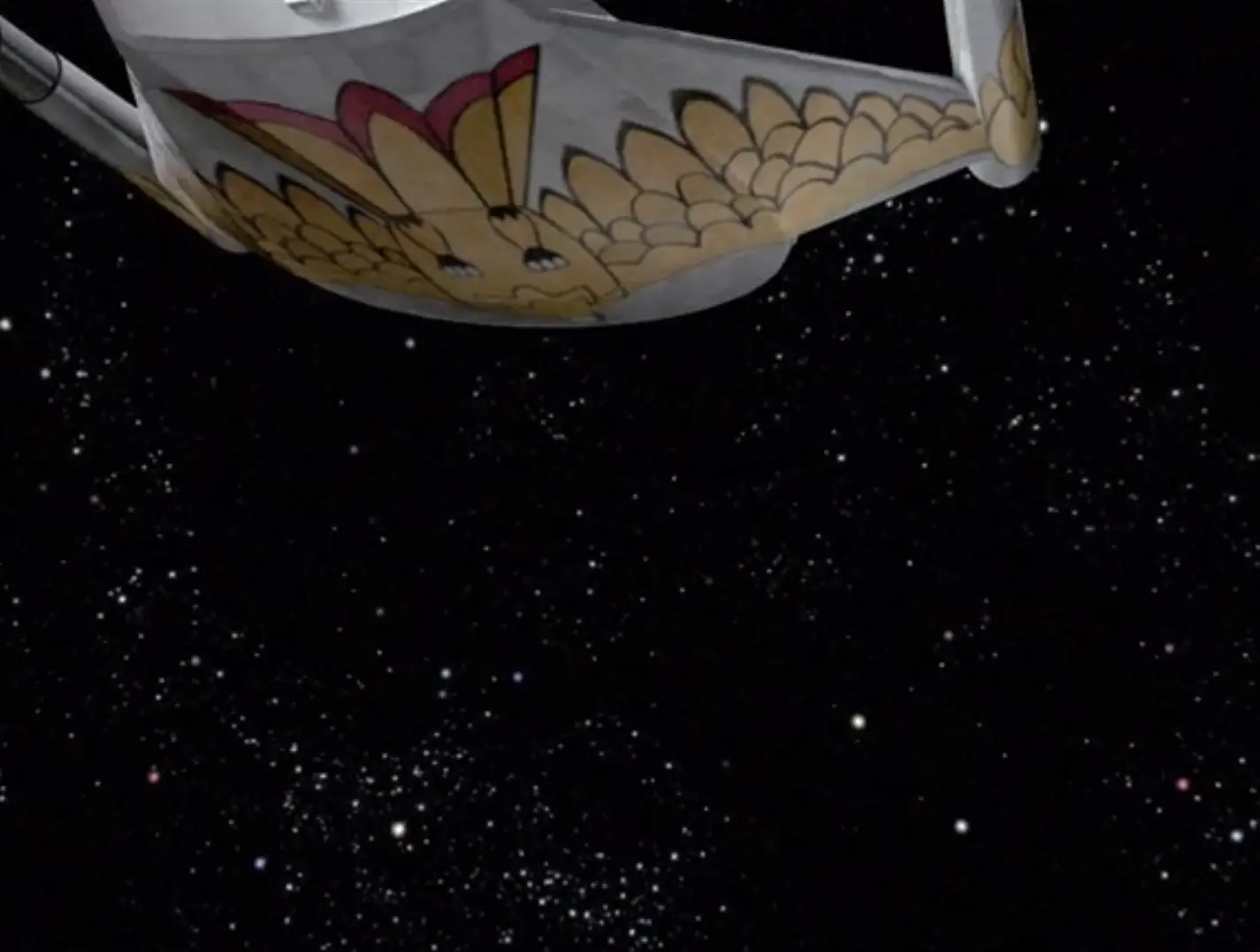
There are some episodes/movies that are so special, they deserve special recognition. I glanced through episode lists, and found sixteen: TOS—Balance of Terror, The City on the Edge of Forever; TOS movies—The Wrath of Khan, The Undiscovered Country; TNG—Family, The Drumhead, The Inner Light, Lower Decks, All Good Things; DS9—Duet, The Visitor, Homefront, Paradise Lost, Far Beyond the Stars, In the Pale Moonlight, It's Only a Paper Moon.
It's not that Voyager and Enterprise are bad; they have a lot of fun episodes, and a lot of good episodes, but not that good. I may have missed some, and there are some great episodes (like "The Best of Both Worlds") that don't quite make the cut for me.
These entries will not have synopses. You owe it to yourself to watch them, and if you've already seen them, you owe it to yourself to watch them again.
Commentary
Game theory is a domain for insane people. I don't mean this lightly. If you've ever seen Dr Strangelove, the titular character is based on real people, chiefly John von Neumann, Edward Teller, and Werner von Braun. Though A Beautiful Mind exaggerated it, John Nash was schizophrenic.
This is the Cold War in a nutshell. It's still geopolitics in a nutshell, or at least that was my experience living in Los Alamos, New Mexico.
"Balance of Terror" is about people who know war, and are trapped between duty and—I don't quite know what. Compassion isn't right. Maybe it's regret, maybe it's exhaustion. This pushes Kirk and the unnamed romulan captain (played, weirdly, by Mark Lenard) into a game they both excel at, and they both hate.
They both know the stakes. If the Bird of Prey makes it back to Romulus, it'll be justification for war. Neither captain wants that, but they both have subordinates who do. The romulan captain is particularly trapped, since he's the aggressor. Trapped between the phasers of the Enterprise, and possible execution if he goes home defeated.
I talked about Teller and Nash because, well, Roger Waters put it well: "Hey bartender over here / Two more shots and two more beers / Sir, turn up the TV sound / The war has started on the ground / Just love those laser guided bombs / They're really great for righting wrongs / You hit the target and win the game / From bars 3,000 miles away / 3,000 miles away."
"In a different reality, I could have called you friend," the romulan captain says. "We are creatures of duty, Captain. I have lived my life by it. Just one more duty to perform."
-
Daily Trek: TOS 1x07, "Charlie X" — I think you've reached your limit

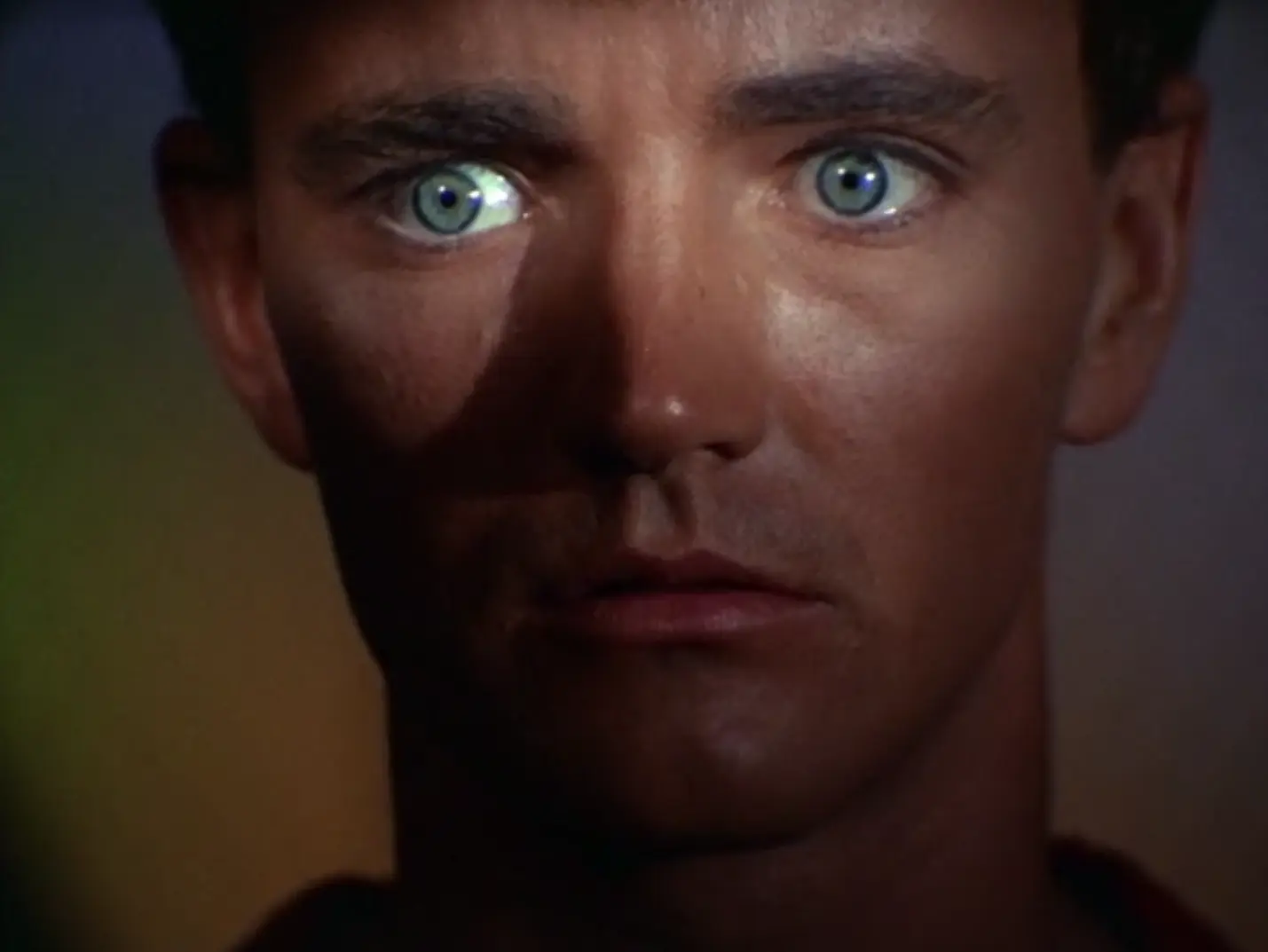
The Enterprise faces the worst threat in the galaxy: a seventeen-year-old boy with godlike powers.
Synopsis
The science ship Antares transfers a passenger to the Enterprise, and the captain of the Antares can't leave fast enough. Charlie Evans runs into Yeoman Rand, and his hormones leave him paralyzed.
In a recreation room, Spock plays the lute and Uhura sings—first about Spock, then about Charlie. Charlie can't handle being the center of attention, and uses his mind powers to silence Uhura. He tries to hit on Rand with card tricks, which entertains her, but doesn't seal the deal.
His powers become increasingly apparent. Kirk initially manages to play the adult and keep him somewhat in line, but eventually Charlie's rebelliousness overtakes his submissiveness. He starts making people vanish, including Rand.
Kirk figures Charlie can't simultaneously control the Enterprise and defend himself from attack. He tells Spock and McCoy to try and jam him, by spuriously running ship systems. This doesn't exactly work, but the aliens who gave Charlie his powers show up and take him with them.
Commentary
By my count—and it's been a while since I've fully watched the original series—Roddenberry created four gods: Gary Mitchell (TOS 1x01, "Where No Man Has Gone Before"), Charlie Evans (this episode), Trelane (TOS 1x18, "The Squire of Gothos"), and Q (TNG 1x01, "Encounter at Farpoint"). He also co-opted some gods for "Who Mourns for Adonais?" (TOS 2x04). I may be missing some.
What's interesting is that two of them are children, and Q is child-like. The big connecting thread is what utter contempt Roddenberry had for God. TNG even pulled the same gambit, that mommy and daddy show up and scold God (TNG 3x13, "Deja Q"), though I'm pretty sure by that time Rick Berman was in charge.
Star Trek is a franchise about secular humanism, that we can overcome ourselves and not just reach for the stars, but deserve the stars. In that sense, the greatest threat is debasement and degeneracy, and nothing is more debased and degenerate than God.
On a separate note, I wish Nichelle Nichols had gotten more time in the spotlight. A few people tried to do music after the original series ended: there's William Shatner's awkward cover of "Rocket Man", and Leonard Nimoy's "Ballad of Bilbo Baggins", but Nichelle Nichols was actually good.
-
Daily Trek: TOS 1x06, "The Naked Time" — Take d'Artagnan here to sickbay

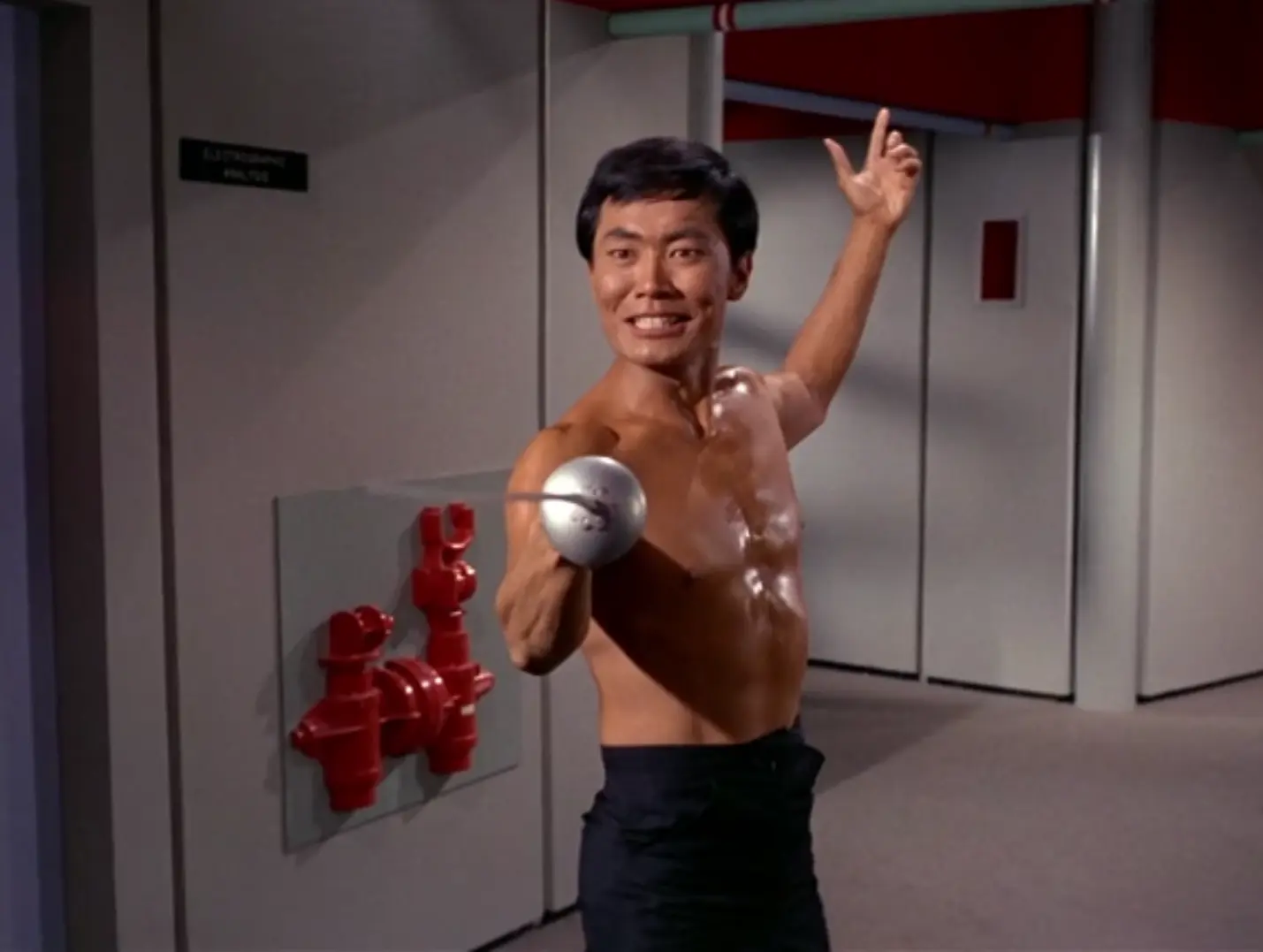
A drunk Irishman and a gay Asian walk into engineering...
Synopsis
The Enterprise has a dual mission: check in on a research station, and monitor the breakup of the planet. The research staff are all dead, frozen to death and apparently indifferent to their deaths. Starfleet's finest extra takes off his glove to scratch his nose and gets infected with—something.
The breakup of the planet requires precision control of their orbit. Meanwhile, the infection is spread by contact and makes the infected act drunk. McCoy can't figure it out. Sulu goes on the hunt for Cardinal Richelieu. And as said above, a drunk Irishman takes over engineering.
This is the second episode with Majel Barrett; she was the first officer in "The Cage," but now she's been demoted to nurse. She gets infected and starts hitting on Spock. Then Spock gets infected and has an emotional breakdown.
So the clock is ticking: Lieutenant Mick turned off the engines, and they need to cold start them. McCoy finds that the infection is an aberrant form of water, and starts treating the crew. Spock figures out how to get the engines going, but the overload sends them back in time. This will be used in increasingly preposterous ways, culminating in Kirk yelling at a San Franciscan, "Double dumbass on you!"
Commentary
This episode is a ton of fun, but there are two serious things that happen.
We get our first glimpse of the torrent of emotions hiding just below the vulcan surface: "My mother... I could never tell her I loved her. An Earth woman, living on a planet where love, emotion is in bad taste. I respected my father, our customs. I was ashamed of my Earth blood. Jim, when I feel friendship for you, I'm ashamed."
And we get our first look at Kirk's melancholy: "Love... you're better of without it, and I'm better off without mine. This vessel... I give, she takes. She won't permit me my life; I've got to live hers." Then later, "Never lose you. Never."
This point, in particular, we'll get back to in my least favorite of the original series movies, The Search for Spock.
-
Daily Trek: TOS 1x05, "The Man Trap" — Vulcan has no moons, Miss Uhura

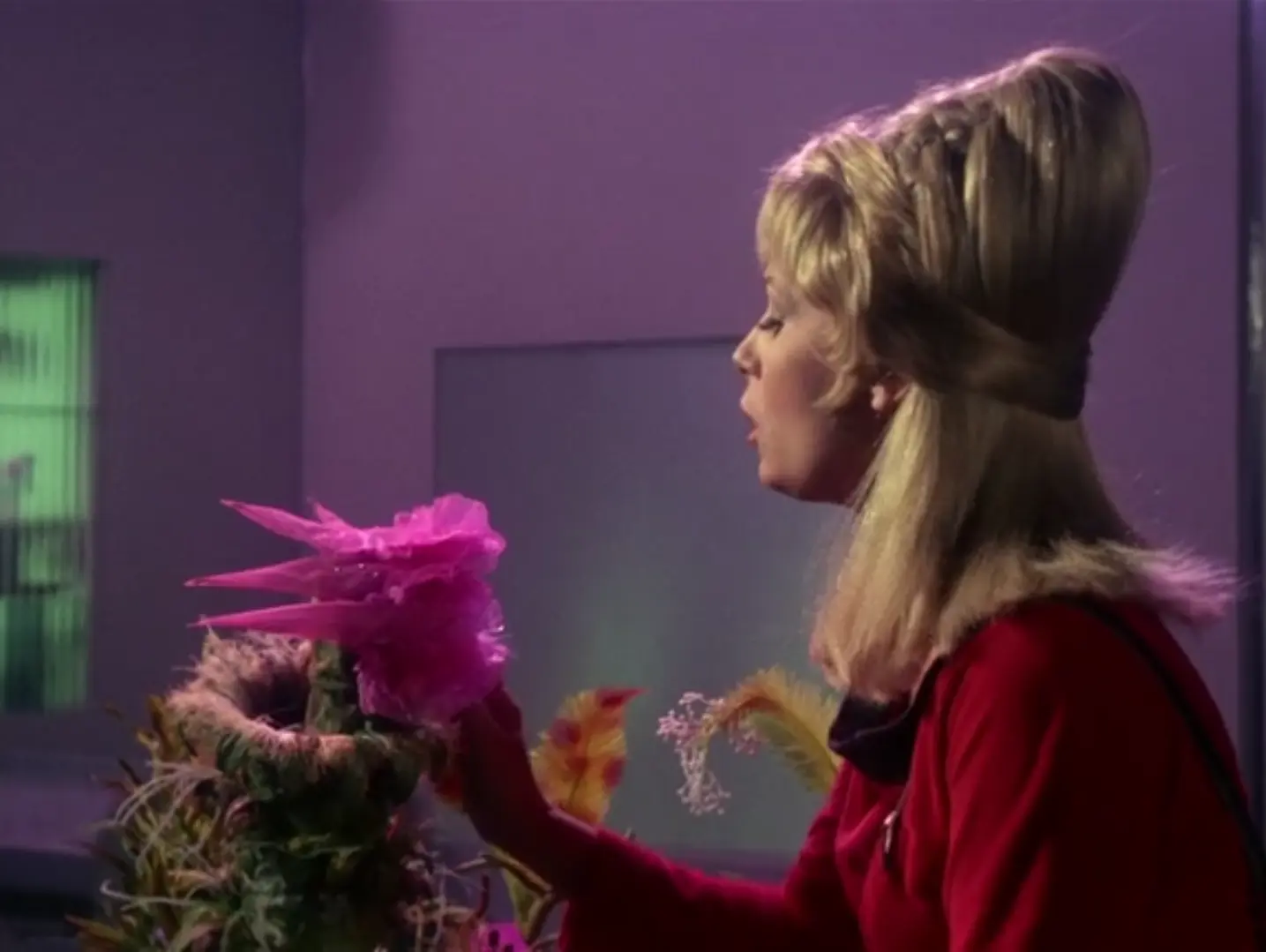
The first monster of the week, but as for the screenshot... Sulu lunches in the botany lab, where he has this plant that was probably once owned by Morticia Addams. I just thought it was cute, having a flower that's really obviously a hand puppet.
Also, "The Man Trap" was the first episode by air date.
Synopsis
The Enterprise stops at a desert planet to give an annual physical to Professor and Mrs Crater, who've been alone and doing an archaeological dig for several years. Initially, everyone sees a different woman when they look at Nancy Crater. Not long after, the extra they brought along so someone could die turns up dead.
Cause of death: total salt depletion. Spock does a search of internet message board arguments but finds nothing.
I'll cut to the chase on this, since the mystery isn't very interesting. There's a telepathic, shapeshifting, sentient alien that feeds on salt. It killed Nancy a year or two prior, but Bob Crater couldn't bring himself to kill it. Instead, he allowed the creature to masquerade as his wife.
After the third murder, the creature imitates a crewman and gets transported up to the Enterprise. They bring Bob up to the ship and have The Debate: Bob says that the creature is intelligent but the last of its kind, comparing it to the American bison; Kirk says that the difference between the creature and the bison is that it's been committing murder.
The creature kills Bob, then flees to McCoy's quarters. Nancy and McCoy were former lovers, and McCoy still holds out a candle. McCoy popped a bunch of benzos earlier and has been asleep most of the episode, so being out of the loop he defends "Nancy" from Kirk. It attacks Kirk, and McCoy is forced to kill it.
Commentary
This is a surprisingly messy episode if you stop and think about it. Bob's arguments for saving the creature boil down to, it's intelligent and just trying to survive. You can't really argue that it just doesn't understand humans, since it's been living with Bob for at least a year. Also, it's telepathic.
It feels like a TNG version of this episode would have the creature be a bit more sensible, and Picard would've bullied Bob into telling them what's really going on, and then they would've supplied the creature with all the salt it could need.
Indeed, this is more or less the plot of "Home Soil" (TNG 1x18).
Kirk probably would've done the same, but the creature went straight for predation rather than telling anyone what it was and what it needed. So how intelligent is it, really?
The standard view in wildlife control is that, if a dangerous animal becomes accustomed to humans, even a relatively sophisticated animal like a black bear, it has to be put down. This is basically how the episode plays out, so any possibility of moral complexity goes out the window and it reverts back to being a monster of the week.
-
Daily Trek: TOS 1x04, "The Enemy Within" — I'm Captain Kirk!

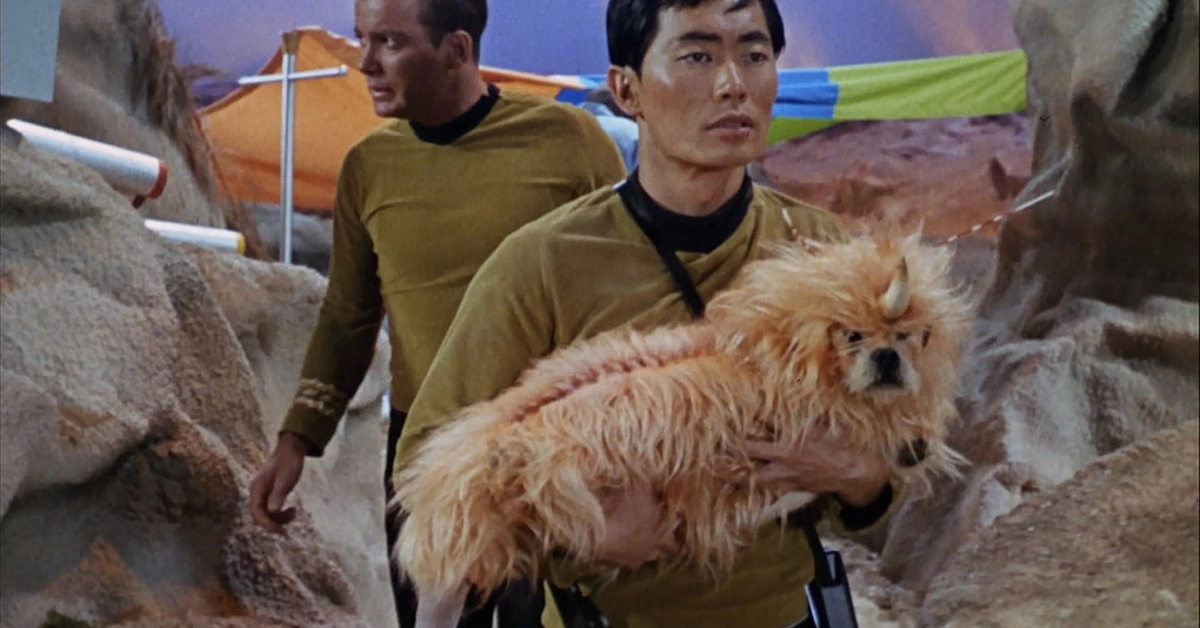
Synopsis
During a survey mission, the crew discovers a dog in a unicorn-lion costume. This is easily the best thing to happen in the whole episode.
A transporter malfunction splits Kirk into a pair of doubles, who we'll call Klumsy and Kreeper, though there's a delay between the creation of the duplicates so they don't know for a while. Klumsy goes to Kirk's quarters, while Kreeper goes to Yeoman Rand's quarters. Kreeper tries to rape her, and she scratches his face.
As Klumsy and Spock talk to Rand, there's a reminder of why Star Trek is so good: Spock says, the only logical conclusion is that there's an imposter aboard.
The ticking clock is that Sulu and the survey team are still planetside, and it gets super cold at night. They can't beam them up, since the Enterprise wouldn't be able to handle the result—which (as we'll learn later) would probably be Sullen and Slutty. They do try to beam down equipment, but the duplication process makes both of them (space heater and specious hunk) useless.
Spock and Klumsy hunt for Kreeper, and capture him—with the first vulcan neck pinch. All throughout, Klumsy has been too timid to really command the ship, and Spock proposes that Kirk needs both halves to be an effective leader.
Things continue along these lines, and ultimately Klumsy and Kreeper are reintegrated using the transporter, and the survey team is saved.
Commentary
I read once that a story can be surprisingly obvious about its theme, and readers/viewers don't mind, and may not even explicitly notice. The Cowardly Lion leads the fight against the Wicked Witch, the Scarecrow plans their attack, and the Tin Woodsman cries all the time. By the time the Wizard of Oz tells them they had courage, a brain, and a heart all along, the viewer believes him.
It's only since I've become a small business owner that I've really come to appreciate how much you need both your "dark" and "light" sides to be able to manage authority. I won't overstate this and say that people are always trying to take advantage of you, but enough of them are, that pessimism is a survival trait. Only by having darkness yourself can you effectively see it in others. And only by having light yourself can you effectively see it in others.
This is a funny situation, since "The Enemy Within" is an incredibly hokey episode—though I think every transporter episode is hokey—and the Good Kirk/Bad Kirk concept is hokier still. After all these years, I've never actually watched "Tuvix." It seems like "Realm of Fear" only exists to refute "um actually transporters kill you and replace you with a clone" stuff. "The Enemy Within" is probably the best take on transporter nonsense.
Also, McCoy says (of a failed attempt to reintegrate doge with dawg), "He's dead, Jim."
-
Daily Trek: TOS 1x03, "Mudd's Women" — They'll throw away the key

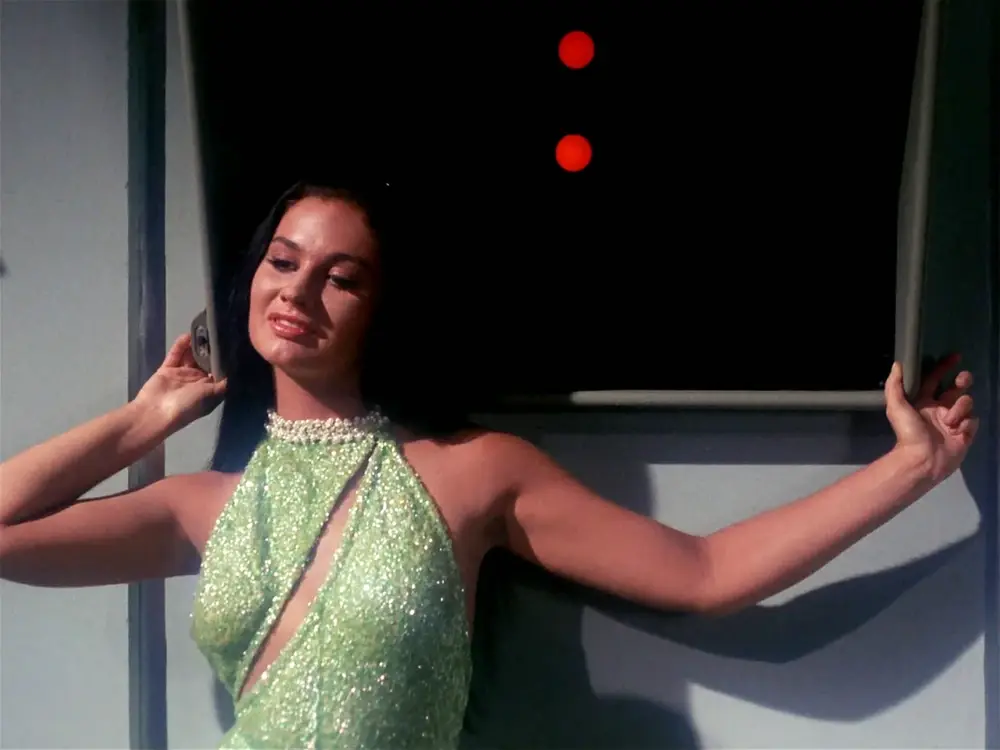
Well this is a tricky one to talk about.
Synopsis
The Enterprise pursues a small, unnamed ship into an asteroid thicket. The pursuit damages the Enterprise's lithium crystals (which would later be called dilithium), but they bring the unnamed ship's four inhabitants onboard before it's destroyed: galactic conman Harry Mudd, and three hot chicks.
The women muddle the minds of the male crew members, except Spock. Kirk maintains greater control of his hormones, but speculates on the effects the women have on him too. They need to get to a mining planet to replace the broken lithium crystals before they lose life support. McCoy also wonders about the strange effect the women have on the men, but he doesn't think too hard about it, if you catch my meaning.
Turns out, Mudd has a miracle pill that makes the women hot, and if they don't have it often enough, their hair gets disheveled and they develop facial prostheses that make them ugly. So this is the con: Mudd sells the women to lonely lithium miners, and the "ugly" women get men to marry (since this is definitely how women work).
Mudd has one of his women steal a communicator, and uses it to contact the mining planet ahead of time, saying that he'll trade the women for the lithium—and for them to blackmail Kirk into letting Mudd go. The miners present these terms to Kirk, and he refuses. With limited power, and an even more limited understanding of orbital mechanics, the Enterprise is going to crash into the mining planet in a few days.
One of the women gained a conscience from her own run-ins with Kirk, and wants out of the con. However, she ends up like-liking one of the miners, and he like-likes her back—even without the wonder pill. She berates the miners into giving Kirk the crystals, so Mudd remains in custody... for now!
Commentary
Well.
So first off, the actual message here is that beauty is not skin deep. This is played both ways: the women are ugly without the wonder pill, and the men are, you know, they're miners on an isolated planet.
I kind of like Harry Mudd, because he's an actual scoundrel. This feels like the opposite of the whole "Han shot first!" business, because it doesn't matter who shot first: Han always comes through. Mudd is just a fuck up, and that's refreshing.
The role of sexuality in Star Trek is its own big topic. I do appreciate that Trek isn't sterile and sexless, and maybe the boldness of doing weird stuff like "Mudd's Women" was what gave future writers the space for stuff like Risa and "Justice" and, later on, letting Jadzia Dax be so sexually open.
Or put another way, sex is an important part of humanity, but it's just so icky and we have to worry about ratings and Catholic boycotts and so forth. I'm not sure that Star Trek would have managed the intensity of humanism if we didn't have Data fucking Tasha Yar in "The Naked Now," or Bashir's awkward attempts at flirting with Jadzia and later success with Ezri, or Jadzia's marriage to Worf or even, awkward as it was, Picard "righting past wrongs" (i.e., not fucking Marta) in "Tapestry."
Getting back to Mudd and his women, part of why this is so tricky for me is that I'm a gay man, so I'm pretty far out of the loop on whether any of this makes any sense. I appreciate that there's a surprisingly fine line between "realistic portrayal of people as they actually are" and "boorish chauvinistic fantasy." I am, frankly, not competent to judge this one, so I guess we'll all have to make up our own minds.
-
Star Trek: Strange New Worlds S2E1 "The Broken Circle" Episode Discussion
Description: A distress call from Lt. Noonien-Singh compels Spock to disobey orders and take the USS Enterprise and its crew into disputed space, risking renewed hostilities with the Klingons in a bid to aid their shipmate.
-
Daily Trek: TOS 1x02, "The Corbomite Maneuver" — Not chess, poker.
I don't know if these posts will be annoying. The thing about posting less frequently is, there's something like five hundred episodes of Star Trek, and I'm not getting any younger. I also hope that—activity begets activity.
This is continuing to follow production order rather than air date, hence the third episode is "The Corbomite Maneuver." It was the tenth episode aired.
Synopsis
The Enterprise is waylaid by a cube, which threatens to kill them with radiation. They destroy the cube, and decide to proceed forward—after all, their mission is to seek out new life, even life that sends out obnoxious cubes.
They're soon set upon by a gigantic sphere that threatens to destroy them, but gives them ten minutes to make peace with their impending deaths. Spock compares their situation to chess, where they've been mated... in passing, maybe. I dunno, Google it.
Kirk decides to play poker instead, and says that all Earth ships (there's no UFP at this point) are fitted with retaliatory superweapons called corbonite devices. This fictional device reflects all attacks, destroying the attacker. The sphere asks for proof, and Kirk says no.
A smaller ship breaks off to tow them to a habitable planet, where it intends to maroon them. Kirk plays chicken with the smaller ship's tractor beam, noting that it heats up their engines but drains power from the other ship. The Enterprise wins, and the small ship powers down.
He beams over with McCoy and Lieutenant Extra—by the way, this is the first episode with McCoy—and find the alien captaining the ship, all by himself, is lonely. The alien wanted to make sure of their intentions before letting them aboard. Kirk leaves Lieutenant Extra behind as a cultural liaison.
Commentary
This episode established another enduring Trek archetype: the monster of the week that turns out to not be a monster. Seeming dangerous isn't the same as being dangerous, and sometimes the apparent danger just wants some understanding.
Also, Kirk's most important character trait is established here, revealing why he's captain rather than Spock. Kirk refuses to lose, and he'll do anything to keep from losing. This is most famously explored in The Wrath of Khan and the Kobayashi Maru scenario. It was designed to be unwinnable, to test the reactions of potential Starfleet officers to an impossible situation. Kirk is one of the only people to have beaten (?) the simulation, and Spock's protege Saavik asks him how he did it. It's simple, he says, I cheated.
It's worth taking a moment to appreciate what a leap forward this was in televised science fiction.
-
What's this community's stance on negative opinions?
There's another community on another instance apparently run by the same people who run r/startrek on Reddit and they can be...zealous to say the least.
Is this community going to allow people who don't like some bits of Star Trek?
-
Daily Trek: TOS 1x01, "Where No Man Has Gone Before" — Morals are for men, not gods.
I figure I'll just get this train rolling and we'll see how it turns out.
It's a bit ambiguous which is the second episode of Star Trek. The first is "The Cage," but I'm pushing that one back until 1x15/1x16, "The Menagerie," which was a sort of clip show of "The Cage."
"Where No Man Has Gone Before" was intended to be the second pilot of Star Trek, but supposedly the studio thought it was too cerebral for television audiences, so they reordered the episodes and aired "The Man Trap" first. I'll be following the ordering on Memory Alpha, which puts "The Man Trap" as episode 1x05. How things will be ordered with your streaming service or DVD collection, who knows.
With this out of the way, let's get to "Where No Man Has Gone Before."
Synopsis
Space stuff happens, and two crew members start to gain extraordinary psychic powers. It's implied here that minor psychic powers aren't that uncommon among humans, though this element would not remain in the series. This is something that the franchise will continue to waffle on: what powers do the vulcans possess, or the betazeds? But for today, some humans can predict playing cards, but Spock cannot yet mind meld.
They find that similar space stuff happened to the Valiant, and that the exponential growth of psychic powers among a few crew members led the captain of the Valiant to use the ship's self-destruct. Meanwhile, an Enterprise crew member, Mitchell, has his eyes turn silver and he quickly discovers the enormous power he has at his disposal.
The space stuff also knocked out the warp drive of the Enterprise, so Kirk takes the ship to an autonomous mining planet to refuel—and to maroon Mitchell. Mitchell's powers grow beyond what any of them can contain, and the same powers awaken in the ship's psychologist, Dehner. Kirk orders everyone back to the ship, while he goes in pursuit of Mitchell and Dehner.
Kirk succeeds in turning them against each other, by asking Dehner to act like a psychologist for only a moment longer: how would she expect a man with unlimited power to act? After all, his psychic powers haven't changed his nature; if anything, the powers have only worsened him. This gives Kirk enough time to beat up Mitchell, while Dehner dies from injuries sustained during her fight with Mitchell.
Commentary
Dehner becomes infatuated with Mitchell, or at least his power, and she comments to Kirk: "Don't you understand? A mutated superior man could also be a wonderful thing, a forerunner of a new and better kind of human being!" For his part, Mitchell says to Kirk, "Command and compassion is a fool's mixture."
There are really two things that jump out at me about this story.
First, Roddenberry had a major preoccupation with the nature of God. This gets played with a lot throughout Star Trek, as we may eventually see—particularly with "The Squire of Gothos," where God is a rambunctious child, and much later in "Encounter at Farpoint," where God is a capricious dick. Q is more memorable than Trelaine, which is entirely down to a long series of fantastic performances by John de Lancie—but hopefully we'll be able to get back to that in a hundred years.
Second, Roddenberry also seems to have been preoccupied with the way Nazis interpreted the übermensch. Nietzsche viewed the overman as one who can create morality, as a light of hope for humanity in an atheistic world. Hitler viewed the overman as one who can eradicate his imagined enemies. The paucity of Hitler's views is another thing that will come up later, particularly with "Space Seed" and The Wrath of Khan. After all, creatures like Mitchell and Khan can't create, they can only destroy—and in that sense, they should be viewed with contempt.
Interestingly, "Where No Man Has Gone Before" and "Space Seed" share one big element: Mitchell and Khan both corrupt a woman, Dehner and McGivers, and both men are undermined by the mercurial nature of both women. Dehner is far more sympathetic on this front, since Kirk appeals to her training as a psychologist, while McGivers just sorta seems unable to control her emotions.
This is one of the great contradictions of the original series: it's incredibly progressive for a 60s show, but it's still a 60s show.
I feel like I've rambled on long enough, so what do you think of the episode? If you haven't seen it, track it down and give it a go: it's definitely a fascinating start to the franchise. And if you think I'm a dumb idiot, feel free to say so in the comments.
-
Suggestion: Daily Trek
To get more discussion going about Trek, I'm thinking of making an episode-or-movie-a-day discussion thread, going more or less in order from the beginning. So this would mean starting with "Where No Man Has Gone Before" (pushing "The Cage" back and combining it with "The Menagerie"), and following the episode order as laid out on Memory Alpha.
Hopefully this'll also inspire people to rewatch Trek, even "Spock's Brain" and "Code of Honor" and "Profit and Lace" and "Threshold" and (god help us) "These Are the Voyages."
The big question right now is, how much interest is there in gettin' real nerdy here?
-
SPOILERS AHEAD So I just finished watching TOS episode Metamorphosis with my roommate, and I wanted to know how you all felt about it.
She felt Kirk's actions were out of character, considering how quickly he went to the nuclear option of trying to incapacitate/potentially kill The Companion before trying to communicate and resolve the issue. I felt that his actions could be justified given that he had someone under his authority dying. I was more bothered by Cochrane's attitude towards The Companion after finding out she was in love with him. My guy, she's kept you alive for 150+ years and communicates via mind meld. How the hell did you not know she loved you? Is this how blind all men are to affection? I can't say I haven't been just as ignorant about it, but I haven't been joining my consciousness with theirs for over a century and a half.
-
Never forget that Picard's PIN is 0000


Alt text: Admiral Picard initiating the self-destruct sequence of the Stargazer by the vocal command, “Authorization: Picard, zero-zero-zero-destruct-zero”
- www.ign.com Star Trek: Infinite Is a New Grand Strategy Game From Paradox - IGN
Star Trek: Infinite grand strategy game announced by Paradox
-
Strange New Worlds - Fan Made Promo
Video
Click to view this content.
Very cool! I wish the actual Star Trek marketing team made promo material that's this good!